209 Most Common Hindi Phrases for Travel [PLUS Printable & Audio]
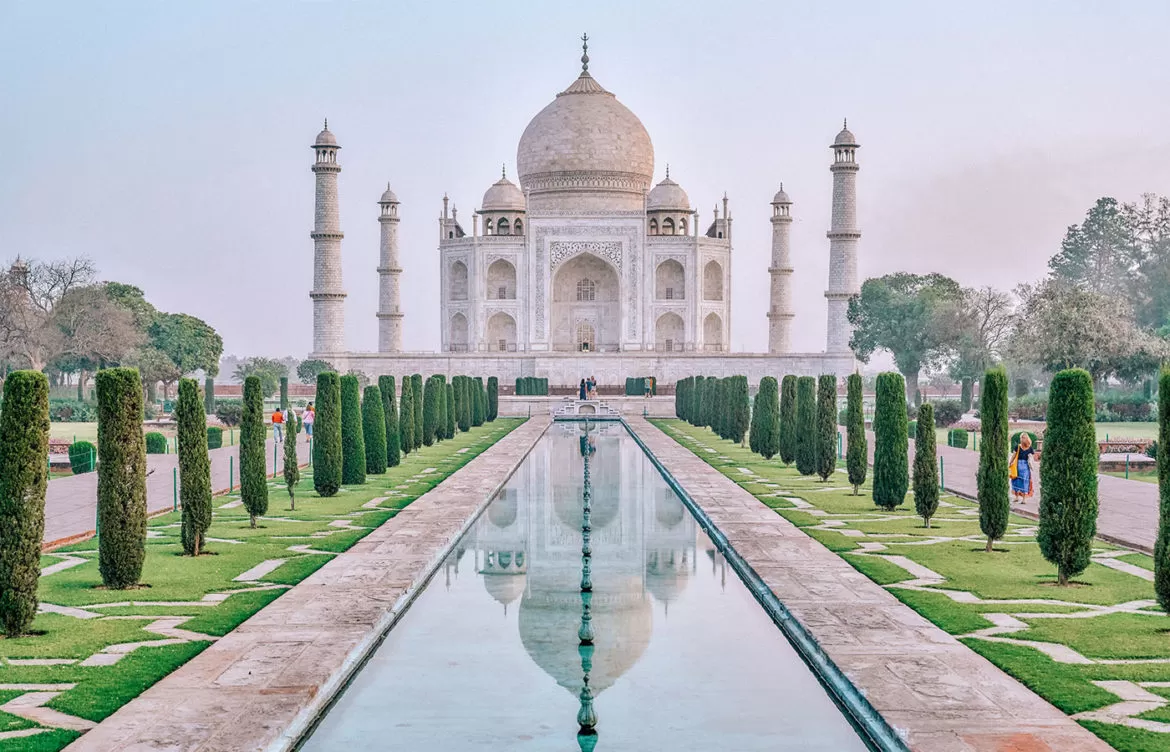

Visiting the Taj Mahal or ordering a yummy curry? Then you need this free printable guide with common Hindi phrases for travel.
Travelling to India and want to learn some common Hindi phrases? You’re in the right place! You don’t have to learn the entire Hindi language to be travel fluent . Just being able to understand and use common Hindi phrases and expressions will make all the difference when it comes to comprehension. This travel phrase guide will introduce you to the Hindi language with details about its origin, where it’s spoken, and more importantly, how to understand and speak Hindi.
Just like all my other travel phrase cheat-sheets , this travel phrase guide full of useful phrases in Hindi includes practical phrases and vocabulary which will help you better understand its speakers and have more meaningful conversations and interactions. To help me create this guide, I asked my friend and Hindi teacher, Babita Craig from Babita’s School of Hindi to provide translations, transliterations, and audio clips to make the learning process easier.
Want to have fun whilst learning Hindi? Struggling to find decent Hindi language resources? I recommend getting uTalk . Available as a desktop site and app, uTalk is awesome for learning key words and phrases in Hindi, especially if you want to use it for travel purposes. It’s great for beginners getting started in a language and invaluable for intermediates looking to fill in gaps in their vocabulary and pronunciation.
What I love most about uTalk is that you can jump around their extensive library of topics and choose what you want to learn, when you want, and at your own pace. Because I believe in uTalk so much, I reached out to them and we’ve teamed up to offer you an exclusive 30% OFF reader discount across all of uTalk’s 140 languages! This offer isn’t available anywhere else! Click here to claim your exclusive 30% discount.
Let’s take a closer look at the Hindi language. Here’s what we’ll cover:
Table of Contents
Where is hindi spoken.
- A Quick History of Hindi
How many people speak Hindi?
Hindi alphabet, hindi pronunciation, hindi grammar, hindi false friends.
- Hindi Words in English
Hindi Culture Travel Tips
How to be polite.
- How to Ask Questions
- Eating out and Ordering Food
Getting Around
Sightseeing, days of the week, emergencies.
- 209 Common Hindi Phrases for Travel [Infographic]
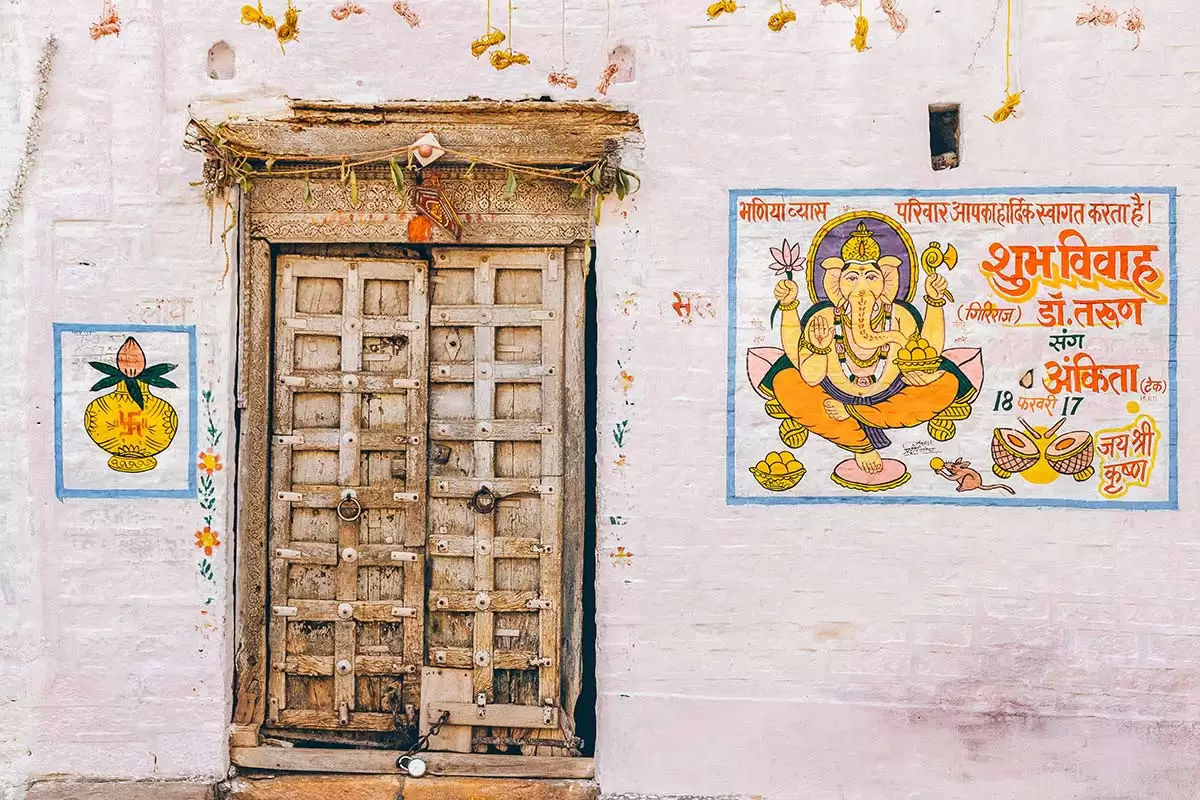
A quick history of the Hindi language
Hindi has its roots in the ancient Indo-Aryan language of Sanskrit; however, modern Hindi, as it is spoken today across India, is closely associated with Urdu, with the main differences being in how they are written and in the high-level vocabulary and culture on which they draw. For example, Hindi, like Sanskrit, is written in the Devanagari script, and is heavily influenced by Hindu culture and history, whilst Urdu, is written in a modified version of Persian, and uses many Persian and Arabic words. Modern Hindi has also taken on many English words, which you will hear used in its everyday spoken form.
The following sentence is a great example of this:
मेज़ पर पानी की बोतल है ( mez par paanee kee botal hai ) – The water bottle is on the table.
Here, the Hindi word for water is used ( paanee ), the Urdu word for table ( mez ) and the English word for bottle , albeit with a slightly different pronunciation.
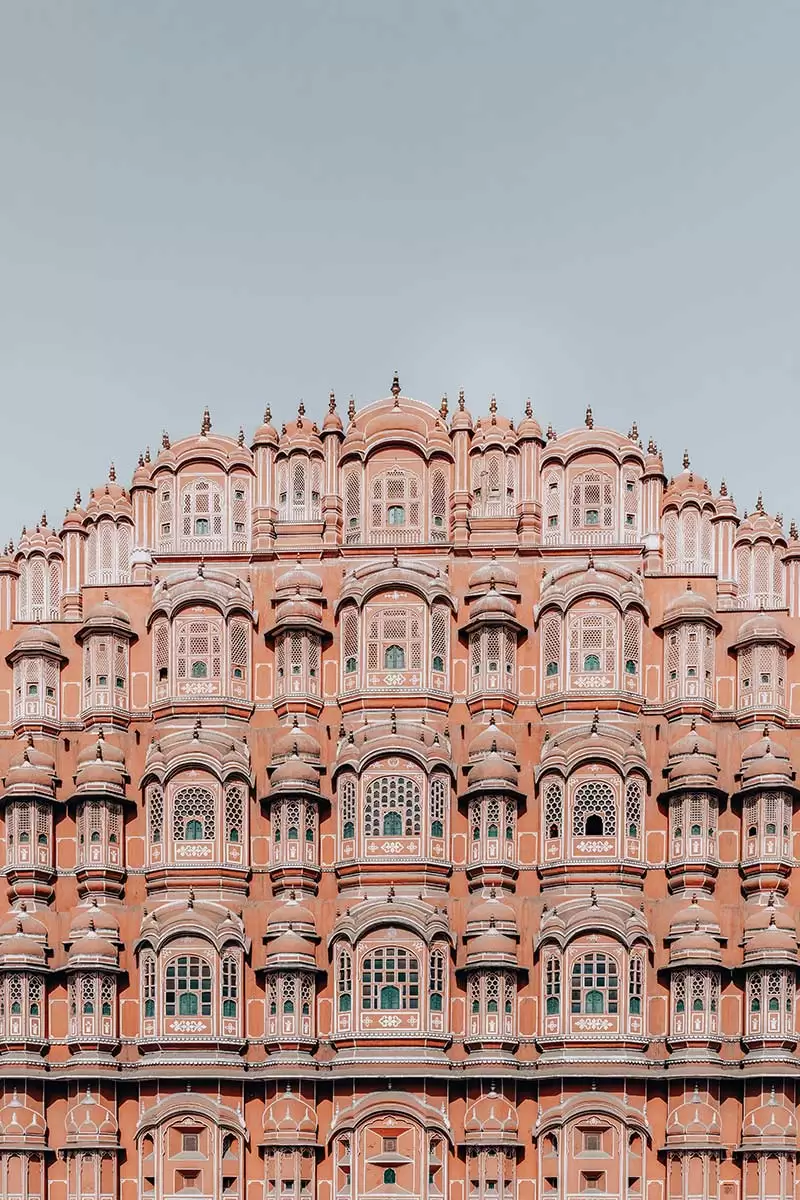
Hindi is written in the Devanagari script, which has 46 letters in total; 35 consonants and 11 vowels, as well as three conjunct letters (a combination of two consonants), which are commonly included.
अ (a) आ (aa) इ (i) ई (ee) उ (u) ऊ (oo) ऋ (ri) ए (e) ऐ (ai) ओ (o) औ (au)
Gutturals क (ka) ख (kha) ग (ga) घ (gha) ङ (gn)
Palatals च (cha) छ ( chha) ज (ja) झ (jha) ञ (yn)
Cerebrals ट (ta) ठ (tha) ड (da) ढ (dha) ण (na)
Dentals त (dha) थ (tha) द (da) ध (dha) न (na)
Labials प (pa) फ (pha) ब (ba) भ (bha) म (ma)
Semi-vowels य (ya) र (ra) ल (la) व (va)
Sibilants श (sha) ष (shha) स (sa)
Glottal ह (ha)
Flaps ड़ (da) ढ़ (dha)
Conjunct letters
क्ष (ksha) त्र (tra) ज्ञ (gya)
Hindi is a phonetic language and is pronounced exactly as it is written. This is much simpler to do if you learn how to read the Devanagari script, for when Hindi is written in the Roman script (like English), there is no official, standardised way of doing so, meaning that pronunciations can vary.
One of the most common issues for speakers from a non-South Asian background is the pronunciation of the Hindi letters that are similar to a ‘t’ and ‘d’ in English. This is because there are four separate letters for both in Hindi, all of which are pronounced differently, with some being dental (where the tongue touches the teeth during pronunciation) and some cerebral (where the tongue touches the roof of the mouth during pronunciation).
Although the grammar of Hindi and English is quite different, there is one general rule which will help you to remember how to put together a sentence. The verb is always found at the end of the sentence and the standard sentence construction is subject + object + verb.
You might also be pleased to learn that Hindi does not have determiners that precede nouns like those that you find in English, such as ‘a’, ‘an’ and ‘the’. However, before you celebrate, you should know that all Hindi nouns have an implied gender (masculine or feminine) – that put quite simply – you have no other option but to learn. On a positive note though, Hindi does not contain any punctuation, apart from ‘।’ which is the equivalent of a full stop.
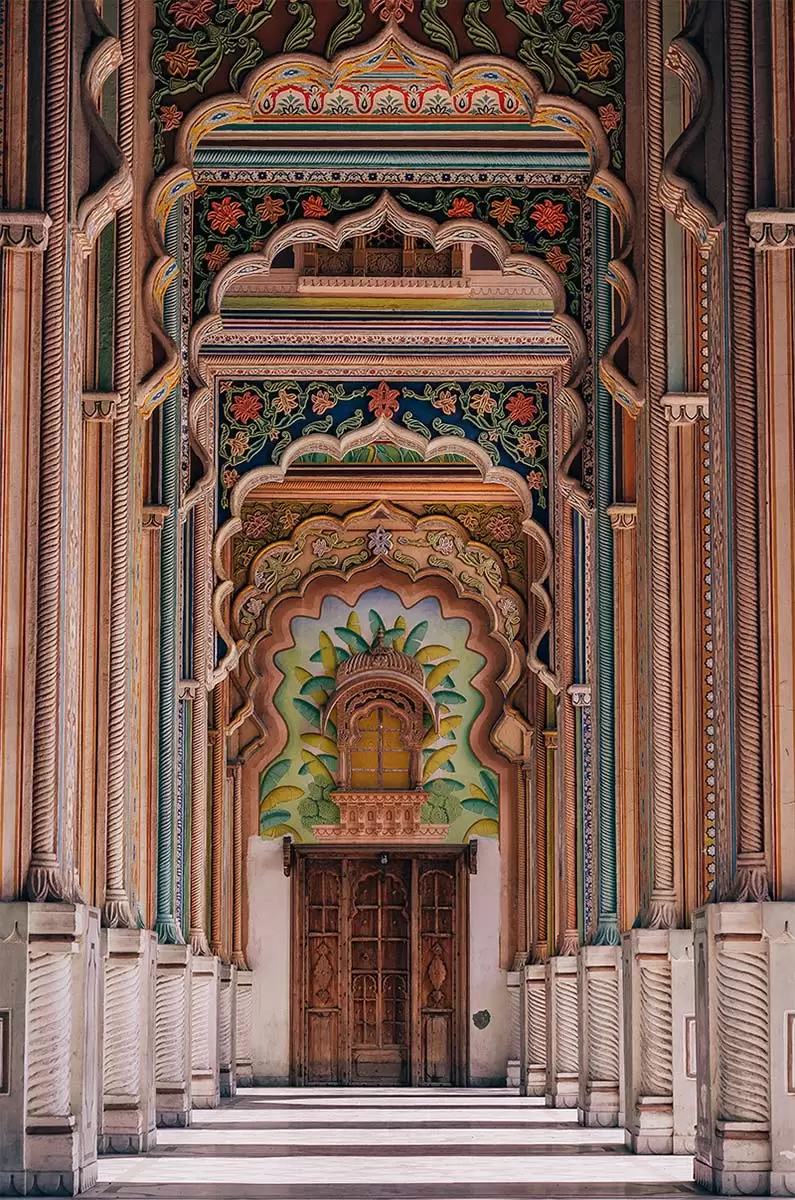
- सफ़र ( safar ) is the Urdu word for travel; however when pronounced it sounds just like the English word suffer.
- लू ( loo ) is the Hindi word for heatstroke but as you know this means something quite different in English.
Hindi words in English
As a result of Britain’s colonial past, there are also a number of Hindi words that are used in English. Here are a couple for you:
- डिंगी ( dingee ) – If you’re fortunate enough to take a trip on the river in India, you may find yourself setting foot onto a dinghy!
- लूट ( loot ) – The English word for loot is taken directly from the Hindi, which similarly means to steal, plunder or pillage.
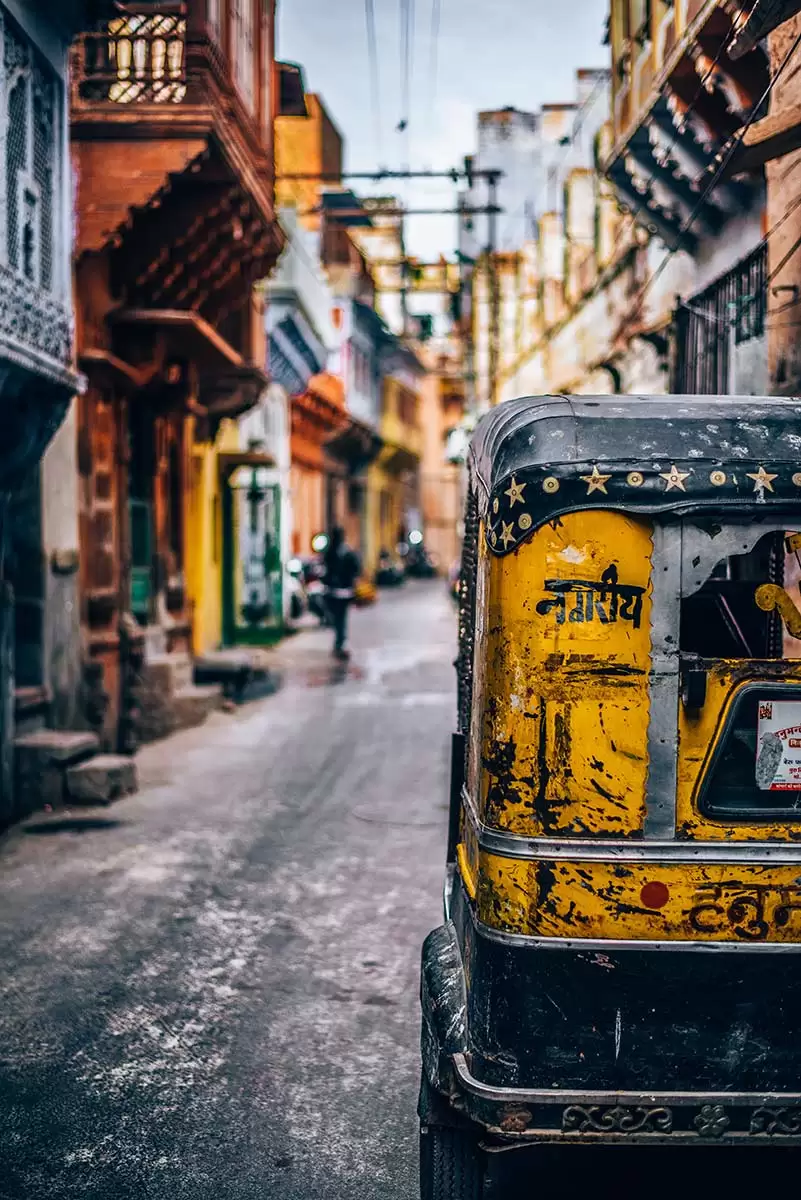
Also, don’t assume that everyone in India will speak or want to speak Hindi with you. Do some prior research on the places that you are visiting and be sensitive to the language and culture of the local population.
If you’re intending to travel to India for any length of time, spend some time getting used to sitting cross-legged on a couch or the ground. It is something that may bring back distant memories of a primary school assembly hall; however, there is nothing more uncomfortable and embarrassing than being invited for dinner at someone’s house and being unable to sit still for the whole evening and then not being able to get up at the end because your knees have locked solid!
Now, let’s take a look at some common Hindi phrases for travellers. NB: When the letter ‘n’ appears in brackets [n], that signifies that the letter before it is nasalised. The ‘n’ in brackets should not be pronounced.
209 Common Hindi Phrases for Travellers
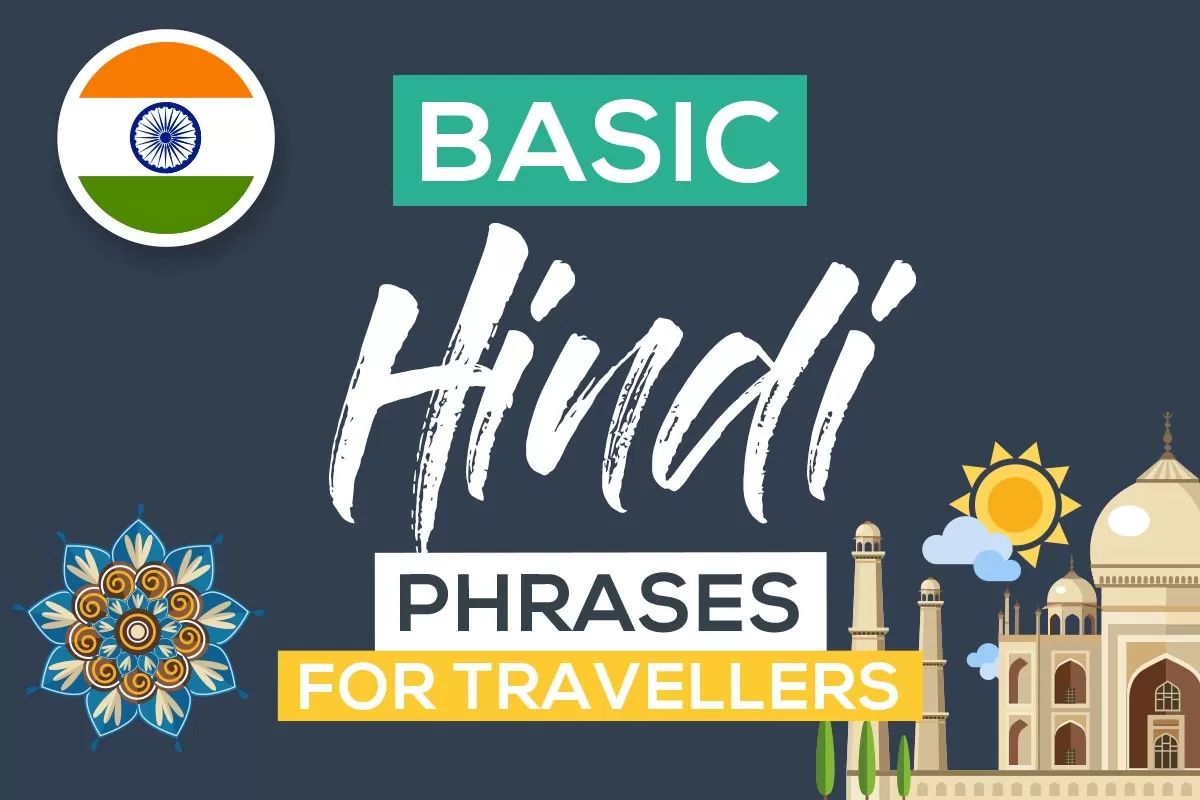
1. Hello – नमस्ते (na-ma-sté) 2. Good morning – शुभ प्रभात (Shubh-pra-bhaat) 3. Good afternoon – नमस्ते (na-ma-sté) 4. Good evening – नमस्ते (na-ma-sté) 5. Good night – शुभ रात्रि (shubh-raa-tree) 6. Goodbye – नमस्ते (na-ma-sté) 7. See you – फिर मिलेंगे (phir milengé) 8. ‘Til next time – अगली बार तक (aaglee baar tak) 9. How are you? – आप कैसे हैं (aap kaisé hai[n]) 10. Good – अच्छा (acchha) 11. So-so – ठीक-ठीक (theek-theek) 12. Not bad – ठीक-ठीक (theek-theek) 13. I’m not well – मैं ठीक नहीं हूँ ( mai[n] theek nahee[n] hoo[n]) 14. Good, thank you, and you? – मैं ठीक हूँ और आप? (mai[n] theek hoo[n] aur aap?) 15. What is your name? – आपका नाम क्या है? (aapka naam kya hai?) 16. My name is… – मेरा नाम _____ है। (mera naam _____ hai?) 17. Where are you from? – आप कहाँ से हैं? (aap kaha[n] sé hai[n]?) 18. I’m from [Insert name of city] – मैं _____ से हूँ ( mai[n] _______ sé hoo[n]) 19. I’m from [Insert name of country] – मैं _____ से हूँ (mai[n] _______ sé hoo[n]) 20. I’m….American (m/f), English (m/f), Australian (m/f), Canadian (m/f) – मैं अमेरिकी हूँ / मैं अंग्रेज़ हूँ / मैं ऑस्ट्रेलियाई हूँ / मैं कनेडियन हूँ ( mai[n] amerikee hoo[n] / mai[n] angrez hoo[n] / mai[n] austreliyaaee hoo[n] / mai(n) kanediyan hoo[n]) 21. It’s nice to meet you – आप से मिलकर ख़ुशी हुई (aap sé milkar khushee hooee)
Greetings Audio
- Good morning
- Good afternoon
- Good Evening
- Til next time
- How are you
- I'm not well
- Good, thank you, and you
- What is your name?
- My name is...
- Where are you from?
- I'm from (insert name of city)
- I'm from (insert name of country)
- I'm American/English/Australian/Canadian
- Its nice to meet you
22. Please – कृपया (krip-ya) NB: Please is usually implied in the verb – so this word is not commonly used. 23. Thank you – धन्यवाद (dhany-vaad) 24. Thank you very much – बहुत धन्यवाद (bahut dhany-vaad) 25. You’re welcome – आपका स्वागत है (aapka swaagat hai) 26. Yes – हाँ (haa[n]) 27. No – नहीं (nahee[n]) 28. That’s fine / ok – यह ठीक है (yeh theek hai) 29. Excuse me (to get attention) – सुनिए ( Suniyé) 30. Excuse me (to get past someone) – माफ़ कीजिए (maaf keejiyé) 31. I’m sorry – माफ़ कीजिए (maaf keejiyé) 32. I don’t understand – मैं नहीं समझा (m.) / मैं नहीं समझी (f.) (mai[n] nahee[n] sam-jha (m.] / mai[n] nahee[n] sam-jhee (f.)) 33. Do you speak English? – क्या आप अंग्रेज़ी बोलते हैं? (kya aap angrezee bolté hai[n]?) 34. I don’t speak Hindi – मैं हिंदी नहीं बोलता हूँ (m.) / मैं हिंदी नहीं बोलती हूँ (f.) – (( m.) mai[n] hindee nahee[n] bolta hoo[n] / (f.) mai(n) hindee nahee[n] boltee hoo[n].) 35. I only speak a little bit of Hindi – मैं सिर्फ़ थोड़ी-थोड़ी हिंदी बोलता हूँ (m.) / मैं सिर्फ़ थोड़ी-थोड़ी हिंदी बोलती हूँ (f.) (mai[n] sirf thodee-thodee hindee bolta hoo[n] (m.) / mai[n] sirf thodee-thodee hindee boltee hoo[n] (f.)) 36. Can you please repeat that slowly? – क्या आप वह फिर से धीरे-धीरे बोल सकते हैं (kya aap woh phir se dheeré-dheeré bol sakté hai[n]?) 37. Maybe – शायद (shaayad) 38. I don’t know – मुझको मालूम नहीं (mujhko maaloom nahee[n]) 39. I don’t think so – मैं ऐसा नहीं सोचता हूँ (m.) / मैं ऐसा नहीं सोचती हूँ (f.) (mai[n] aisa nahee[n] sochta hoo[n] (m.) / mai[n] aisa nahee[n] sochtee hoo[n] (f.)) 40. Certainly! Of course! – ज़रूर बिल्कुल (zaroor / bilkul)
How to be Polite Audio
- Thank you very much
- You're welcome
- That's fine, ok
- Excuse me (to get attention)
- Excuse me (to get past someone)
- I don't understand
- Do you speak English
- I don't speak Hindi
- I only speak a little Hindi
- Can you please repeat that slowly?
- I don't know
- I don't think so
- Certainly! Of course!
- May I pay with cash?
How to ask Questions
41. Where is …? ______ कहाँ है? (______ kaha[n] hai?) 42. Where are…? ______ कहाँ हैं? (______ kaha[n] hai?) 43. Where? – कहाँ? (kaha[n]?) 44. How? – कैसा? ( kaisa?) 45. How much? – कितना? ( kitna?) 46. Who? – कौन? (kaun?) 47. When? – कब? (kab?) 48. Why? – क्यों? (kyo[n]?) 49. What? – क्या? (kya?) 50. Which? – कौन सा / सी? (kaun sa/see?) 51. How much does this cost? – यह कितने का है? (yeh kitné ka hai?) 52. How much does that cost? – वह कितने का है? (woh kitné ka hai?) 53. Where is the toilet? – शौचालय कहाँ है? (shau-chaa-lay kaha[n] hai?) 54. I would like… – मुझको _____ चाहिए (mujhko _____ chaahiyé)
How to ask Ask Questions Audio
- Where is...?
- Where are...?
- How much does this cost?
- How much does that cost?
- Where is the toilet?
- Can I have...
- I would like...
Eating Out & Ordering Food
55. Where is a good restaurant? – अच्छा भोजनालय कहाँ है? (acchha bhoj-naa-lay kaha[n] hai?) 56. What shall we make for you? – हम आप के लिए क्या बनायें? (hum aap ké liyé kya banaayé[n]?) 57. How many are you? – आप कितने लोग हैं? (aap kitné log hai[n]?) 58. Salad – सलाद (salaad) 59. Dessert – मिठाई / मीठी चीज़ (mithaa-ee) (sweets) / (meethee cheez) (sweet dish) 60. Drinks? पेय / ड्रिंक्स – (pey) (this is almost never used) / drinks – the English word is ordinarily used 61. Another one, please. – एक और दीजिए (ek aur deejiyé) 62. I would like… – मुझको _____ चाहिए (mujhko _____ chaahiyé) 63. The menu, please – मेन्यू दीजिए (menu deejiyé) 64. Two beers, please – दो बियर दीजिए (do biar deejiyé) 65. A bottle of wine, please – एक वाइन की बोतल दीजिए (ek vaain kee botal deejiyé) 66. Red wine – लाल वाइन (laal vaain) 67. White wine – सफ़ेद वाइन (safed vaain) 68. A bottle of still water – पानी की बोतल (paani kee botal) 69. A bottle of sparking water – सोडे की बोतल (sode kee botal) 70. What do you recommend? – आप क्या सलहा देंगे? (aap kya salha dengé?) 71. Is the sauce spicy? – क्या ग्रेवी तीख़ी है? (kya grevee teekhee hai?) 72. I’m allergic to… – मुझको _____ से अलेरजी है (mujhko _____ sé allergee hai) 73. I’m a vegetarian – मैं शाकाहारी हूँ (mai[n] shaakaahaari hoo[n]) 74 The bill, please – बिल दीजिए (bill deejiyé) 75. Enjoy your food! – खाने का मज़ा लीजिए (khané ka maza leejiyé) 76. It was delicious! – खाना स्वादिष्ट था (khana swaadisht tha)
Eating Out & Ordering Food Audio
- Where is a good restaurant?
- What shall we make for you?
- How many are you?
- Another one, please
- The menu, please
- Two beers, please
- A bottle of wine, please
- A bottle of still water
- A bottle of sparking water
- What do you recommend?
- Is the sauce spicy?
- I'm allergic to...
- I'm a vegetarian
- The bill, please
- Enjoy your food
- The food was delicious
77. I’m(male) – मैं खो गया हूँ (mai[n] kho gaya hoo[n]) 78. I’m lost (female) – मैं खो गयी हूँ (mai[n] kho gayee hoo[n]) 79. I would like to go to… – मैं _____ जाना चाहता हूँ (m.) / मैं ______ जाना चाहती हूँ (f.) ( mai[n] ____ jaana chaahta hoo[n] (m.) / mai[n] ____ jaana chaahtee hoo[n] (f.)) 80. How do I get to… – मैं _____ तक कैसे जा सकता हूँ (m.) / मैं _____ तक कैसे जा सकती हूँ (f.) ( mai[n] ____ tak kaisé ja sakta hoo[n] (m.) / mai[n] _____ tak kaisé ja saktee hoo[n] (f.)) 81. Where is …? – _____ कहाँ है? (_____ kaha[n] hai?) 82. the bathroom – शौचालय (shau-chaa-lay) 83. the (train) station – (ट्रेन) स्टेशन (train station) 84. the shops – दूकान (dookaan) 85. the restaurant – भोजनालय (bhoj-naa-lay) 86. the museum – संग्रहालय (sangra-haa-lay) 87. the post office – डाक ख़ाना (daak khana) 88. the market – बाज़ार (baazaar) 89. the pharmacy – दवा की दूकान (davaa kee dookaan) 90. the hospital – अस्पताल (aspataal) 91. the bus stop बस स्टॉप (bus stop) 92. the airport – हवाई अड्डा (havaa-ee addaa) 93. the information office – सूचना कार्यालय (soochnaa kaar-yaa-lay) 94. the theatre – थिएटर (thi-é-tar) 95. the park – पार्क (park) 96. the city/town centre – शहर का केंद्र (shaher ka kendra) 97. Entrance – प्रवेश (pravesh) 98. Exit – निकास (nikaas) 99. the timetable – समय-सारणी (samay-saar-nee) 100. departure – प्रस्थान (prasthaan) 101. When does it arrive there? – यह वहाँ कब पहुँचेगा? (yeh vahaa[n] kab pahu[n]chega?) 102. How long does it take to get there? – वहाँ पहुँचने में कितना समय लगेगा? (vahaa[n] pahu[n]chné mé[n] kitna samay lagega?) 103. How much is the fare? – किराया कितना है? (kiraaya kitna hai?) 104. the train – ट्रेन (train) 105. the flight – उड़ान (udaan) 106. the baggage – सामान (saamaan) 107. I need a taxi – मुझको टैक्सी चाहिए (mujhko taxi chaahiyé) 108. Please stop here (to a taxi driver) – यहाँ रोकिए (yahaa[n] rokiyé)
Getting Around Audio
- I'm lost (male)
- I'm lost (female)
- I would like to go to...
- How do I get to...?
- The bathroom
- Train station
- the restaurant
- The post office
- The pharmacy
- The hospital
- The bus stop
- The airport
- The information office
- The theatre
- The city town centre
- The timetable
- When does it arrive there
- How long does it take to get there
- How much is the fare
- The baggage
- I need a taxi
- Please stop here (to a taxi driver)
109. Turn… – मुड़िए (moodiyé) 110. Left – बायाँ (baayaa[n]) 111. Right – दायाँ (daayaa[n]) 112. Straight ahead – सीधा (seedhaa) 113. Towards… – की तरफ़ (kee taraf) 114. It’s close by – यह पास है (yeh paas hai) 115. Across from – सामने (saamné) 116. Behind – पीछे (peeché) 117. Under – नीचे (neeché) 118. Before – पहले (pahelé) 119. Past – के आगे (ké aagé)
Directions Audio
- Straight ahead
- It's close by
- Across from
120. I would like… – मुझको _____ चाहिए (mujhko _____ chaahiyé) 121. a ticket – टिकट (ticket) 122. two tickets – दो टिकट (do ticket) 123. two adults – दो व्यस्क (do vyask) 124. one child – एक बच्चा (ek baccha) 125. one student – एक विद्यार्थी (ek vidyaarthee) 126. one senior – एक वरिष्ठ नागरिक (ek varishth naagrik)
Sightseeing Audio
- Two tickets
- One student
127. 0 – शून्य / ज़ीरो (shoonye/ zero) 128. 1 – एक (ek) 129. 2 – दो (do) 130. 3 – तीन (teen) 131. 4 – चार (chaar) 132. 5 – पाँच (paanch) 133. 6 – छः (cheh) 134. 7 – सात (saat) 135. 8 – आठ (aath) 136. 9 – नौ (nau) 137. 10 – दस (das) 138. 11 – ग्यारह (gyaarah) 139. 12 – बारह (baarah) 140. 13 – तेरह (terah) 141. 14 – चौदह (chaudah) 142. 15 – पंद्रह (pandrah) 143. 16 – सोलह (solah) 144. 17 – सत्रह (satrah) 145. 18 – अट्ठारह (ataarah) 146. 19 – उन्नीस (unnees) 147. 20 – बीस (bees) 148. 30 – तीस (tees) 149. 40 – चालीस (chaalees) 150. 50 – पचास (pacchaas) 151. 60 – साठ (saath) 152. 70 – सत्तर (sattar) 153. 80 – अस्सी (assee) 154. 90 – नबे (nabé) 155. 100 – सौ (sau) 156. 1000 – हज़ार (hazaar)
Numbers Audio
Telling the time.
157. Today – आज (aaj) 158. Tomorrow – कल (kal) 159. The day after tomorrow – परसों (parso[n]) 160. Yesterday – कल (kal) 161. Soon – जल्द ही (jald hi) 162. Later – बाद में (baad me[n]) 163. Excuse me, what time is it? – सुनिए, कितने बजे हैं? (suniyé, kitné bajé hai[n]?) 164. When does it open? – यह कब खुलता है ? (yeh kab khulta hai?) 165. When does it close? – यह कब बंद होता है? (yeh kab band hota hai?) 166. in the morning – सुबह (subah) 167. in the afternoon – दोपहर को (dopehr ko) 168. It’s 1 o’clock – एक बजा है (ek baja hai) 169. It’s 6 o’clock – छः बजे हैं (cheh bajé hai[n]) 170. It’s half past 8 – साढ़े आठ बजे हैं (sadhé aath bajé hai[n]) 171. a minute – एक मिनट (ek minute) 172. an hour – एक घंटा (ek ghantaa)
Telling the time Audio
- The day after tomorrow
- Excuse me, what time is it?
- When does it open?
- When does it close?
- In the morning
- In the afternoon
- It's one o'clock
- It's 6 o'clock
- It's half past eight
173. Monday – सोमवार (somvaar) 174. Tuesday – मंगलवार (mangalvaar) 175. Wednesday – बुधवार (budhvaar) 176. Thursday – गुरुवार (guruvaar) 177. Friday – शुक्रवार (shukravaar) 178. Saturday – शनिवार ( shanivaar) 179. Sunday – रविवार (ravivaar)
Days of the Week Audio
180. Help! – मदद कीजिए (madad keejiyé) 181. I need a doctor – मुझको डॉक्टर चाहिए (mujhko doctor chaahiyé) 182. I feel ill – मुझको मेरी तबियत ठीक नहीं लग रही है (mujhko meree tabiyat theek nahee[n] lag rahee hai) 183. I have pain here – मुझको यहाँ दर्द है (mujhko yahaa[n] dard hai) 184. Call… – फ़ोन कीजिए ( phone keejiyé) 185. the police – पुलिस (pulis) 186. an ambulance ऐम्ब्युलन्स (ambulance) 187. the fire brigade – फ़ाएअर ब्रिगेड (fire brigade) NB: There is a Hindi word for fire brigade but nobody uses it and instead the English word is used! 188. There’s a fire – यहाँ आग लगी है (yahaa[n] aag lagee hai) 189. Watch out! – सावधान (saavdhaan) 190. Stop, thief! – चोर को रोकिए (chor ko rokiyé) 191. Go away! – यहाँ से जाओ (yahaa[n] sé jaao) 192. There’s been an accident – यहाँ एक दुर्घटना हुई है (yahaa[n] ek dur-ghat-na hooee hai) 193. Damage – नुक़सान / हानि (nuksaan / haani) 194. Pain – दर्द (dard) 195. I’ve been assaulted/attacked – मुझ पर हमला हुआ (mujh par humlaa huuaa) 196. I lost my passport – मेरा पास्पोर्ट खो गया (mera passport kho gaya) 197. Where is the American/British/Australian/Canadian embassy? – अमेरिकी / ब्रिटिश / औस्ट्रेलियन / कनेडियन दूतावास कहाँ है? (amerikee / british / austreliyan / kanediyan dutaavaas kaha[n] hai?) 198. Police station – पुलिस स्टेशन (pulis station)
Emergencies Audio
- I need a doctor
- I have pain here
- An ambulance
- The fire brigade
- There's a fire
- Stop, thief
- There's been an accident
- I've been assaulted/attacked
- I lost my passport
- Where is the American/British/Australian/Canadian Embassy
- Police station
199 . Are you looking for something? क्या आप कुछ ढूंढ़ रहे हैं? (kya aap kuch dhoo(n)dh rahé hai(n)?) 200. Can I help you? – क्या मैं आप की मदद कर सकता हूँ (m.) / क्या मैं आप की मदद कर सकती हूँ (f.) (kya mai[n] aap ki madad kar sakta hoo[n] (m.) / kya mai[n] aap ki madad kar sakti hoo[n] (f.)) 201. What are you looking for? – आप क्या ढूँढ रहे हैं? (aap kya dhoo(n)dh rahé hain?) 202. May I just look? – क्या मैं यह देख सकता हूँ (m.) / क्या मैं यह देख सकती हूँ (f.) (kya mai[n] yeh dekh sakta hoo[n] (m.) / kya mai[n] yeh dekh sakti hoo[n] (f.)) 203. That’s too expensive! – यह बहुत महँगा है (yeh bahut mahenga hai) 204. Can you give me a discount? – क्या आप मेरे लिए कुछ पैसे कम कर सकते हैं? (kya aap meré liyé kuch paisé kam kar sakté hai[n]?) 205. I’ll buy it! – मैं यह ख़रीदूँगा / मैं यह ख़रीदूँगी (mai[n] yeh khareedunga / mai[n] yeh khareedungi) 206. Anything else? – और कुछ? (aur kuch?) 207. Nothing else, thank you. – और कुछ नहीं, धन्यवाद (aur kuch nahee(n), dhanyavaad) 208. May I pay with credit card? – क्या मैं कार्ड से पैसे दे सकता हूँ (m.)/ क्या मैं कार्ड से पैसे दे सकती हूँ (f.) (kya mai[n] card sé paisé dé sakta hoo[n] (m.) / kya mai[n] card sé paisé dé saktee hoo[n] (f.)) 209. May I pay with cash? – क्या मैं नक़द पैसे दे सकता हूँ (m.) / क्या मैं नक़द पैसे दे सकती हूँ (f.) (kya mai[n] nakad paisé dé sakta hoo[n] (m.) / kya mai(n) nakad paisé dé saktee hoo[n] (f.))
Shopping Audio
- Are you looking for something
- Can I help you?
- What are you looking for?
- May I just look?
- That's too expensive
- Can you give me a discount?
- I'll buy it
- Anything else
- Nothing else, thank you
- May I pay with credit card?
209 Most Common Hindi Phrases for Travellers [Printable Guide]

Like it? Pin it for later!
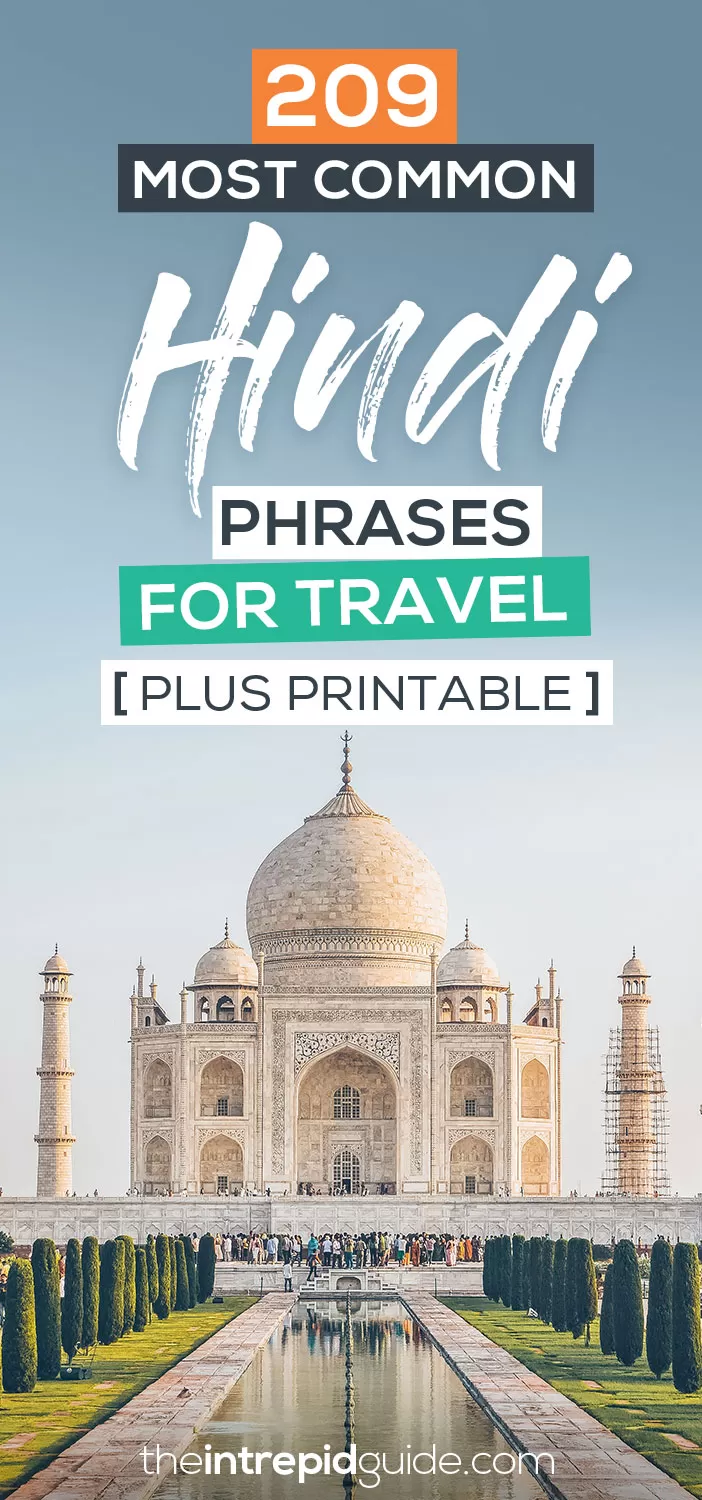
Sources / A big thanks to Babita Craig a professional Hindi teacher based in London. Having trained and taught for nine years at India’s famous Landour Language School, she set up Babita’s School of Hindi, London, in 2019, where she teaches a broad range of students in-person and online.
Want to know more about learning languages? Start here!
- What Type of Language Learner Are You? Your 4-Step Personalised Learning Plan
- 18 Unexpected Advantages & Health Benefits of Learning A Foreign Language
- How to Learn Languages Like Crazy, Even If You Have a Crazy Life [3-Step Method]
- 10 Pro Tips: How to Learn a Language with a Full-Time Job
- 44 Best Movies on Disney Plus for Learning Languages
- 6 Language Learning Tips: How to Learn a Language from Home
- How to Learn Your First Foreign Language in 8 Simple Steps: A Beginner’s Guide
- Essential Travel Phrases: How to be Travel Fluent in 10 Simple Steps
- 7 Reasons Why You Should Go on a Language Holiday
- 20 Top Language Learning Resources You Should Use
- 13 Ways to Seamlessly Integrate Language Learning into Your Daily Life
- 23 Cool Gifts for Language Learners They Will Actually Use and Love
- 11 Life-Changing Reasons Why You Should Learn a Language
- 42 beautiful Inspirational Quotes for Language Learners
- Language learning tips: 11 Polyglots Reveal The Secrets of Their Success
- Top 10 Best Ways to Learn a Language Better and Faster
- How to Learn Italian Before Your Trip
- Free Travel Phrase Guides
- How Many Languages are there in the World?
- Mondly Review: 10 Ways Mondly Drastically Improved My Language Learning
- 78 FREE Dictionaries to Learn a Language Fast [Free eBook Download]
- 22 KEY Travel Phrases That Will Transform Your Travels [Free Guide]
Over to you!
Which of these Hindi phrases did you find the most useful? Let me know in the comments section below or join me on social media to start a conversation. Thanks for reading and I hope you enjoyed this post. Like what you see? Subscribe using the form below to have all of my posts delivered directly to your email.
Success! Now check your email to confirm your subscription.
There was an error submitting your subscription. Please try again.
Get my best language and travel tips FREE by email...
Subscribe to my newsletter to receive detailed travel guides, exclusive travel and language learning tips, priority access to giveaways and more!
I will never give away, trade or sell your email address. You can unsubscribe at any time.
Michele creates language learning guides and courses for travel. What separates her from other instructors is her ability to explain complex grammar in a no-nonsense, straightforward manner using her unique 80/20 method. Get her free guide 9 reasons you’re not fluent…YET & how to fix it! Planning a trip? Learn the local language with her 80/20 method for less than the cost of eating at a tourist trap restaurant Start learning today!
How to Master Italian Phrases for Travel FAST!
25 funny french idioms and expressions you’ll love using.
I am so excited I found this website, I am chanting mantras and I just met a lady, I gave myself the rest of the year to learn all of this. Thanks you very much Michele for this amazing post, I will help you share and will text you later on your Instagram, Facebook, linked in or any other social I found you, You are fantastic.
Hola, estoy muy pero muy emocionado, encontre esta pagina y justamente estoy recitando mantras y conoci una chica y me he dado lo que resta del año para aprender todo esto. Gracias Michele, Te voy a contactar por la redes porque me interesa mucho tu contenido.
thank u sooo much!!! those phrases are really helpful… thanks a lot
My pleasure 🙂 I’m so glad to hear that.
Leave a Comment Cancel Reply
Save my name, email, and website in this browser for the next time I comment.
This site uses Akismet to reduce spam. Learn how your comment data is processed .

If you don't know where you are , how do you know where you're going? Find out how well you know Italian grammar today!
Useful Hindi Words & Phrases for Travellers
If you are going to be visiting India we highly recommend you try to pick up some of the basics of the language before arriving.
India can be a huge culture shock with noise, people, huge bustling cities, the food and of course the different language. Also don't be fooled into thinking everyone either speaks English or will understand you.
You can though make your whole experience easier by trying to grasp some basic words and phases.
This is recommended even if you are planning on booking a tour of India , a package holiday or travelling independently. Of course you won't be able to get fluent overnight but even if you know some words you will really enhanced your experience and make everyday things easier e.g. accommodation, buying things, getting directions or help.
To be able to even say something as simple as hello and thank you in the local language will always bring a smile to the locals. It is also very respectful to know some commons greeting phrases.
Check out essential Hindi phrases you should learn for travel in India below:
- Hello/Hi - Namaste
- Good morning - Suprabhaat
- Good evening - Shubh sundhyaa
- Welcome - Aapka swaagat hai
- See you - Phir milenge
- Let’s go - Chalo
- Good night - Shubh raatri
- See you later - Phir milen-gay
- Good bye - Alvida
- Thank you - Dhanyavad
- Sorry - Maaf kijiye
- Excuse me - Suniye
- Can You Say It Again - Kyaa aap issey dohraa saktey hain
- Please Speak Slowly - Kyaa aap dheerae baat karengae
- Write It Down Please - Kripaya karkey yeh likkh deejeeae
- I Don't Understand - Mujhey samajh mein nahi aataa
- I Don't Know - Mujhey nahi maloom
- No Problem - Koee baat nuhee
Conversational
- How are you? - Aap kaise hain?
- How are you? - Kya haal hai?
- I’m fine. You? - Main theek hoon. Tum?
- What is your name? (formal) - Aapka naam kya hai?
- What is your name? (informal) - Tumhara naam kya hai?
- My name is Peter - Mera naam Peter hai
- Do you speak English? - Kyaa aap Angrézee
- How old are you? - Aapkee umar kyaa hai?
- I'm from America - Mein Amerika
- Where do you live? - Aap kahaan rehtey hain?
Food & Drink
- I’m hungry - Mujhe bhookh lagi hai
- I’m thirsty - Mujhe pyaas lagi hai
- I would like a cup of tea – Mujhe ek cup chai chahiye
- Water – Paani
- I would like a bottle of water – Mujhe ek bottle paani chahiye
- Food – Khana
- Beef = Gomaans
- Chicken = Chicken
- Lamb = Lamb
- Fish = Machli
- Pork = Pork
- Vegetables = Subzi
- Salad = Salad
- Bread = bread
- Rice = Chawal
- Potato = Aalu
- Soup = Soup
- How much does this cost? - Ye kitne ka hai?
- Lower the price – Daam kum kijiye
- I like this - Mujhe pasand hai
- I don’t like this - Mujhe pasand nahi hai
- Clothes – Kapra
- Good - Accha
- Great - Bahut accha
- Where are the restrooms? - Shauchalay kahan hai?
Directions & Getting Around
- Taxi - Taxi
- Train - Train
- Subway - Metro
- Bus - Bus
- Street - Sa-dak
- Left - Ba-yen
- Right - Da-yen
Emergenices
- I feel sick - Meri Tabiyut kharaab hai
- I need a doctor - Mujhey Doctor kee zaroorat hai
- Doctor = Doctor
- Police = Pulis
- Pharmacy = Chemist
Plan a Trip to India
If you would be keen to stay a little longer than your average tourist view our guide to learning Hindi in India where you can search courses from top rated language schools.
If you are keen to visit India and are interested in seeing different travel options our website features volunteer programs in India and India gap year programs - some companies offer combo travel/language courses which are a great way to go sightseeing and also pick up some of the language.
- Leave a reply
Provide feedback, share your experience and submit your comment.
Related Opportunities
Au pair usa.
- InterExchange
- United States
- 1 year to 1 Year+
Backpacking Vietnam
- Backpacking Tours
- 2 weeks to 3 weeks
- 1250 to 1500 £ Pound (UK)
Cycle Vietnam's Back Roads
- G Adventures
- 2 weeks to 2 weeks
Maldives Marine Life Volunteer Program
- Secret Paradise Maldives
- < 1 week to 4 weeks
- 1000 to 2500 $ Dollars (US)
Total Asia Tour
- Multiple Destinations
- 1 week to 2 weeks
Vietnam Uncovered
- Topdeck Travel
- 1000 to 1250 £ Pound (UK)
Volunteer Teaching in Jaipur, India
- Jaipur, Rajasthan
- 1 week to 6 months
- 250 to 2500 $ Dollars (US)
Volunteer & Teach Underprivileged Children in Da Nang City, Vietnam
- Volunteer Vietnam
- Da Nang City, Vietnam
- 2 weeks to 3 months
- 750 to 2500 $ Dollars (US)
Related Articles
Useful vietnamese phrases for travellers.
Check out our essential Vietnamese words and phrases perfect if you want to grasp the basics of the language and are goi...
Learn Javanese
Javanese is a language spoken on the island of Java in Indonesia and in some other locations in South-East Asia. Arou...
The Greatest Female Travellers Of All Time
When thinking about who are the greatest travelers of all time are, some names usually come into mind like Christopher C...
5 Spring/Summer Events that Showcase the Best of Britain
In Britain, we excel in delivering pomp and circumstance.
Learn Vietnamese in Vietnam
Does the idea of learning Vietnamese appeal to you? On our guide to studying Vietnamese in Vietnam we have put together ...
Essential Hindi Words and Phrases for Travel to India
It is true that the whole country does not speak Hindi. Not even the whole North of India speaks Hindi. However, most of the people understand and can communicate in Hindi in India. You can travel to all the regions in the country with nothing but English and Hindi.
Hindi is spoken in Delhi , Haryana, Bihar, Uttar Pradesh, Jharkhand, Madhya Pradesh, Rajasthan, Himachal Pradesh, Chhattisgarh and others. Citizens of Maharashtra, Gujarat, Bengal, Orissa and Punjab might not know Hindi as it is not their mother tongue. However, they can obviously understand it. Bangalore, Andhra Pradesh and Telengana are also filled with people who can understand and talk in Hindi. It is quite difficult to expect the same kind of popularity in Kerala , Tamil Nadu and North-East India.
India is a land, which takes pride in its culture. Therefore, if you speak to them in their mother tongue, it is considered as you taking an effort to live their culture and locals will come forward to make your vacation, even better.
Do not worry about grammar or fluency. A few phrases here and there to your butler, waiter or porter can help you a lot. Based on our team of avid travelers’ experiences, here is a consolidated list of Hindi phrases and meaning to use.
- Namaste – It is a respectful greeting to start and end a conversation. It is similar to hello or hi.
- Chalo – Let’s go
- Bahut Hua – Enough
- Accha or Thik hai – Okay
- Kya – What?
- Mujhe Maaf Kijiye – Excuse me
- Dhanyabad or Shukriya – Thank you ( Madad ke liye dhanyawaad – Thank you for your help)
- Police ko Bulaungee – I’ll call the police
- Mujhe jaana hai - I have to go
- App kaha ja rahe hai – Where are you going?
- Aap kaise hain ? – How are you?
- Main thik hoon – I’m fine
- Aap ka naam kya hai ? – What’s your name?
- Mera naam ….hai – My name is….
- Aap se mil ke khushi hui – It’s nice to see you
- Phir milenge – We will meet again.
- Kya samaya hai ? – What’s the time?
- Mujhe malum nahi – I don’t know
- Mujhe India pasand hai – I like India
- Bathroom Kahan hai ? – Where is bathroom?
- Mujhe Hindi nahi aati – I can’t speak Hindi
- Mujhe peene ka pani chahiye – I want drinking water
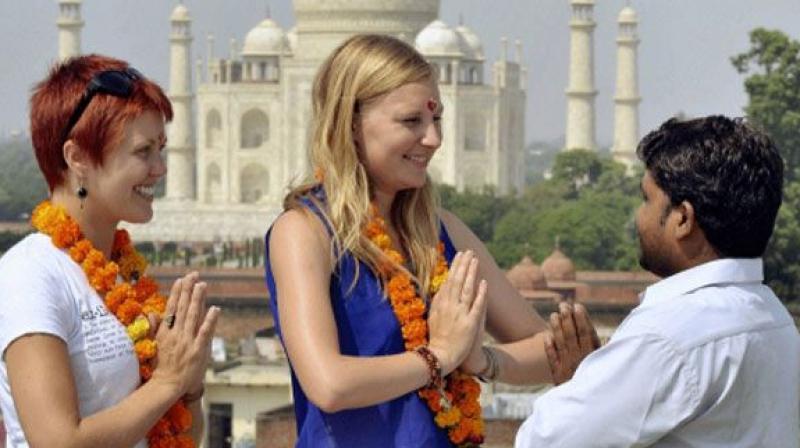
How To Address People?
Sir and madam are quite common understandable words in India. If you want to address them in their mother tongue,
- Bhaiyaji – Brother
- Behenji – Sister
- Aap ka – Yours
Words You Need In A Restaurant
- Paani – water
- Khana – food
- Chawal – rice
- Naasta – breakfast
- Cheeni – sugar
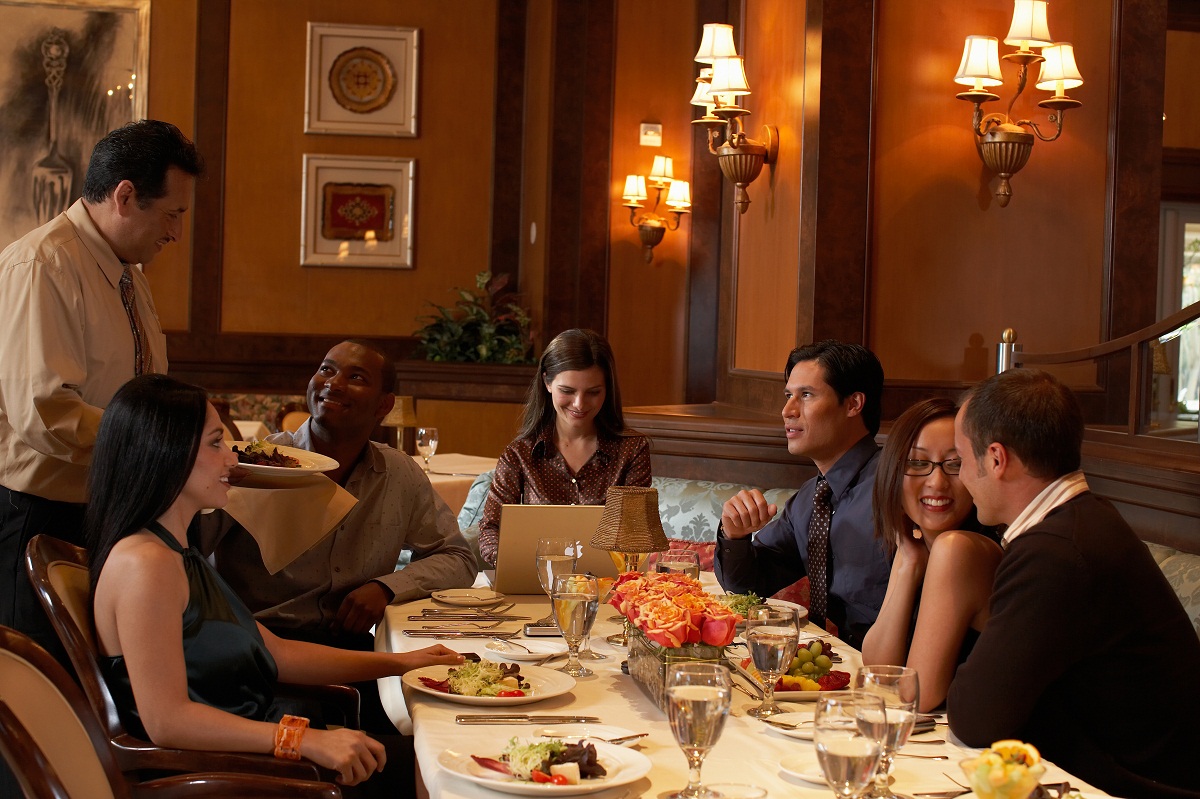
Are you a foodie? Try our exclusive food tour packages like
- Mumbai street food tour (by night)
- Delhi cultural experience – cook and eat with a local family
- Healthy and Delicious Breakfast of India – Food Guide for Travelers
- Top Five Regional Indian Biryanis for Foodies
- Top Ten Street Foods to Taste in Jaipur
- Traditional Dishes to Try in Rajasthan
Shopping Essentials
If you are going for shopping, you need to know the numbers in Hindi and a few phrases.
- Yeh bahaut mehenga hai – It’s too expensive
- Nahi Chahiye – I don’t want
- Yeh kitne ka hai ? – What is the cost of this?
- Mujhe yeh chahiye – I want this one
- ……Kahan milegee – Where can I find ….?
0 – Shunya, 1 – Ek, 2 - Do, 3 - Teen, 4 - Char, 5 – Paanch, 6 – Chhai, 7 – Saat, 8 – Aath, 9 – Nau, 10 – Dus.

Are you ready for shopping? Read Best Shopping Destinations in India with Specialities and learn what to buy.
- Best Shopping Places in Delhi
- Famous Places for Shopping in Rajkot
- Top 10 Colourful Markets in Rajasthan
- The Best Places to Purchase Handicrafts in India
Now that you have started with Hindi, it is time to pick a package with numerous Hindi speaking destinations.
Essential India Travel Guide :
- What To Wear In India – Essential Packing List
- How to Get India Tourist Visa – A Complete Guide
- Tailor-Made India Tour – What to Expect?
- What Do I Need To Travel To India?
- 15 Essential Tips to Know Before You Travel To India
- Planning A Trip to India – Ten Step Guide Explained
- Is India Safe for Solo Female Travellers?
Related Packages
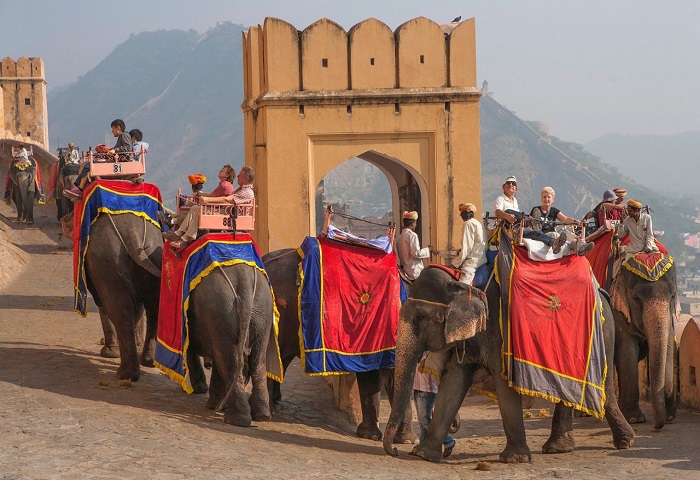
5 Days - Rajasthan Tour - Jaipur Pushkar Mount Abu
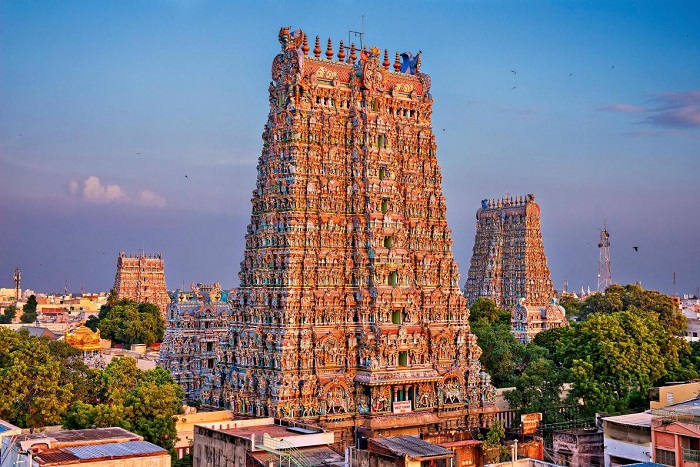
4 Days - Madurai Rameshwaram Kanyakumari Temple Tour
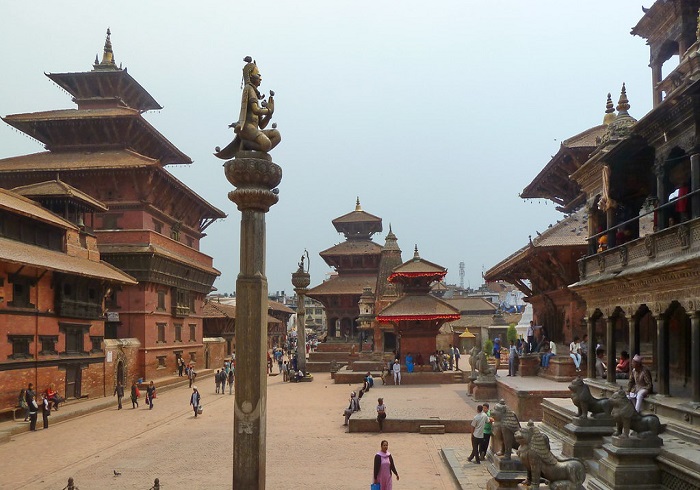
10 Days - Nepal Tour Packages
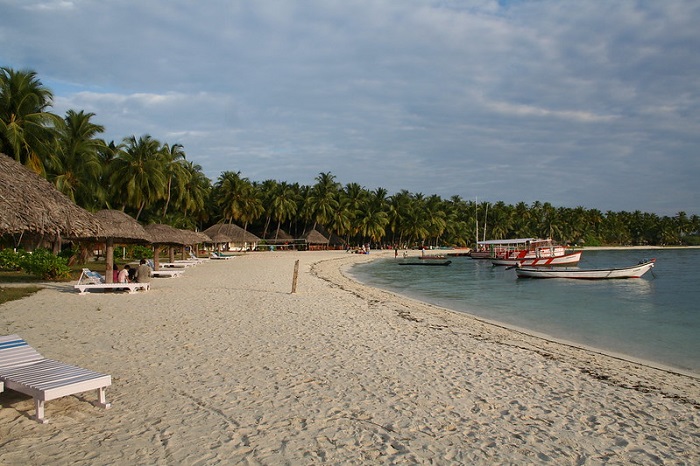
7 Days - Lakshadweep Tour from Kerala

5 Days - Lakshadweep Honeymoon Tour
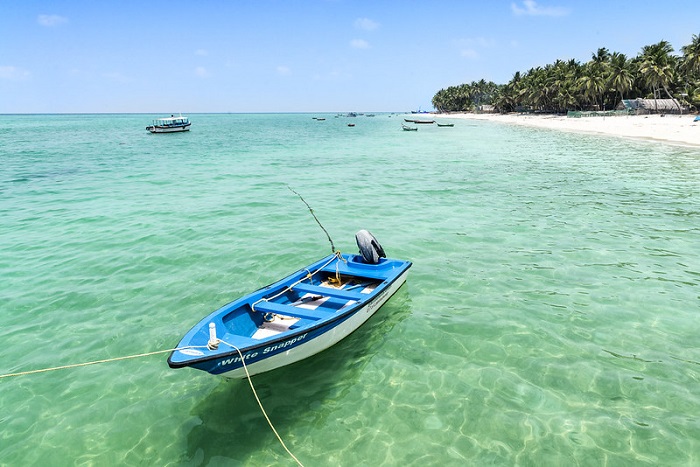
5 Days - Itinerary of Lakshadweep Tour

7 Days - North East India Tour Packages
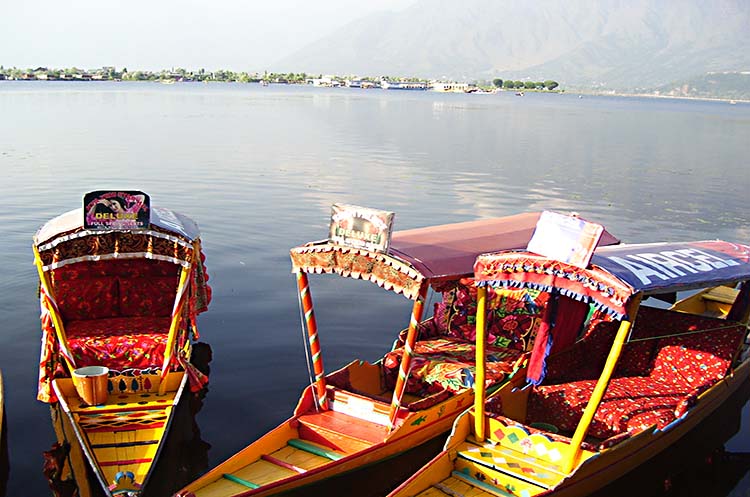
4 Days - Srinagar Tour
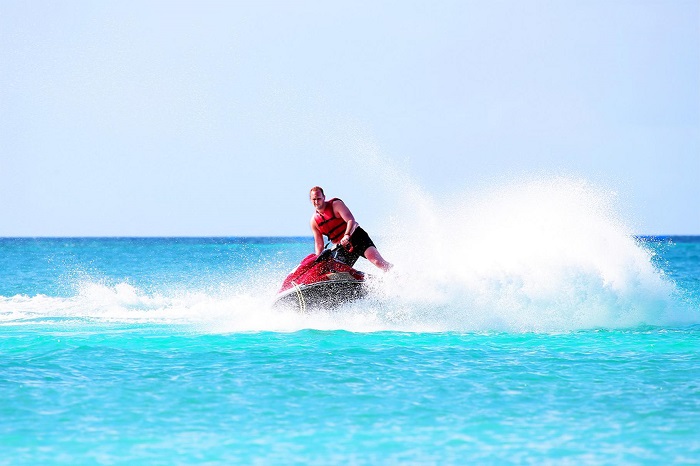
6 Days - Tour Itinerary Lakshadweep
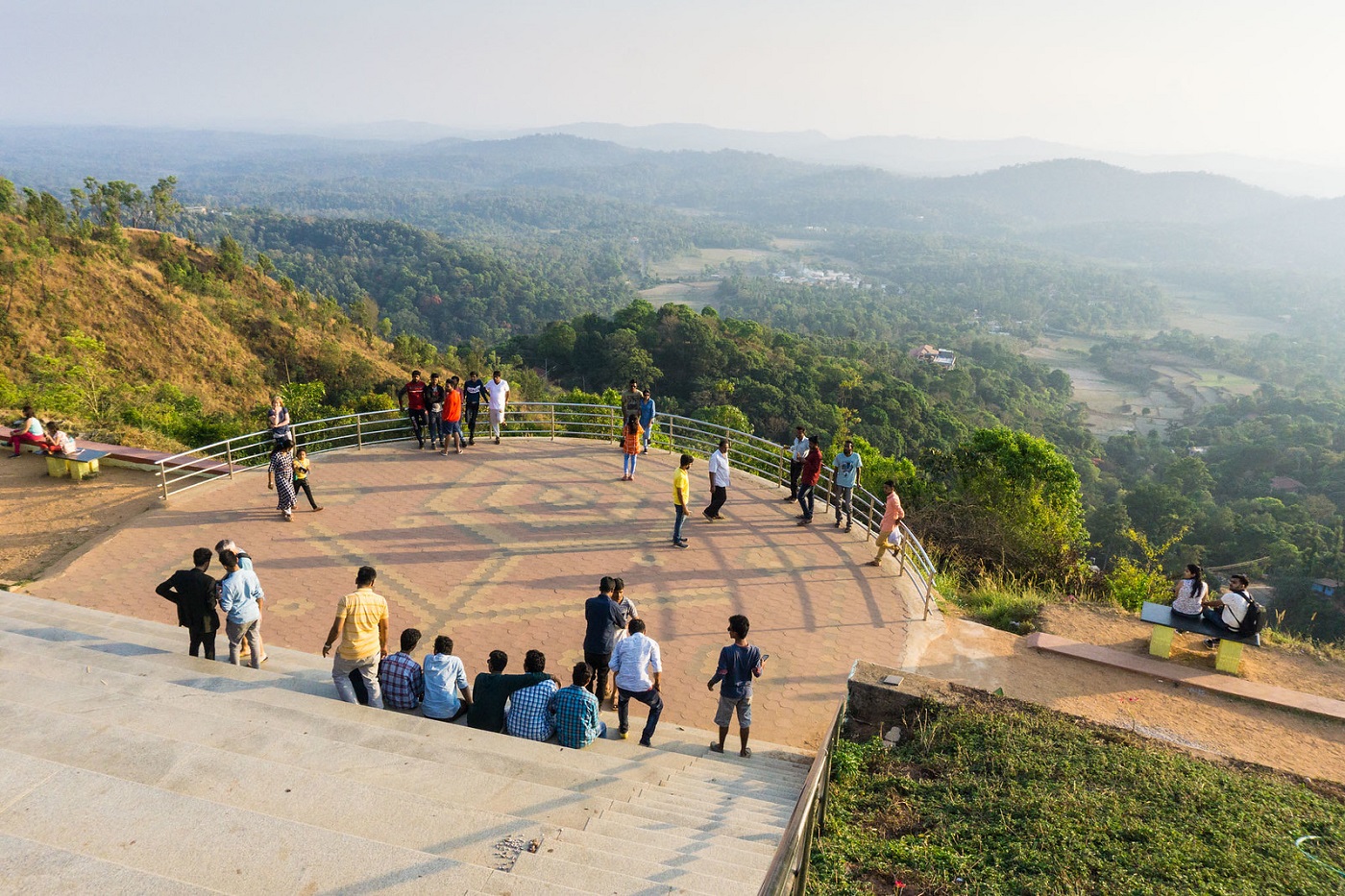
4 Days - Coorg Madikeri Hill Station Tour Karnataka
- North India
- Uttarakhand
- South India
- Andhra Pradesh
- Central India
- North East India
- Arunachal Pradesh
- Other Destinations
- Jammu & Kashmir
- Andaman & Nicobar
- First Timers
- Family Holidays
- Golden Triangle
- Himachal Pradesh
- Lakshadweep
- Jammu Kashmir
- Andaman Nicobar
- First Timer Tours
- Wildlife Tour
- Honeymoon Tours
- Heritage & Culture
- Adventure Tours
- Spa & Ayurveda
- Taj Mahal Tour
- Luxury Train
- Beaches Tours
- Hill Station Tours
- Pilgrimage Tours
- Chardham Yatra
Luxury Trains
- Palace on Wheels
- Maharajas' Express
- Deccan Odyssey
- Golden Chariot
- 1 to 5 Days
- 6 to 10 Days
- 11 to 15 Days
- 16 to 20 Days
Help Center

- Terms & Conditions

Table of Contents
Hello everyone, I hope you all are doing great. In this blog we are going to discus about basic Hindi phrases . This will be very useful for International tourists while travelling in India and also you would not face any kind of problem. Before jumping on our topic, let’s start from basic information about India.

India is the 7th largest country in the World by area and is the second largest country in the world in terms of population. India is known as the home of many languages. Different languages are spoken in different parts of india. But Hindi is the major and official language of India. Hindi is the most widely spoken and understood language in India.
More than 60% of the people in India can speak Hindi. India has total 28 states and 8 Union territories. Hindi is the major language of Bihar, Delhi, Haryana, Jharkhand, Madhya Pradesh, Rajasthan, Uttarakhand, and uttar Pradesh. People from Maharashtra, Karnataka and Telangana also speak and can understand Hindi language.
Learning any new language is a little difficult but not impossible. If you learn some basic sentences in Hindi , you will not have to face any obstacle during the journey. For this, take a look at the following sentences and use them while traveling in India. I’m sure it will help you.
Basic Hindi Phrases:

- Hi- Namaste/Namskar.
- What’s your name-Aapka naam kya hai?
- My Name is Rushikesh-Mera naam Rushikesh hai.
- where-kaha.
- you- Tum/Aap.
- How- kaise.
- Mine- Mera.
- Ok-Thik hain.
- Stop-Rukiye.
- Sit-Baitho.
- Stand up-Khade ho jao.
- Let’s go-Chalo.
- Fast-Jaldi.
- Slow-Dheere.
- Not a problem-Koi baat nahi.
- Seriously-Such main.
- Amazing-Bahot accha/Bahot sundar.
- Help me-Meri Madad kro.
- Keep it-Rakho.
- Why not-Kyu nahi.
- Give me-Mujhe dedo.
- Thank you-Shukriya/Shukriya bhaisahab.
- How are you-Aap kaise ho.
- I’m fine-Main accha hu.
- Start-Chalu karo.
- What happened?-Kya hua?
- Turn on-Chalu karo.
- Turn off-Band karo.
- I can speak Hindi-Mai Hindi bol sakta hu.
- Which Way-Kaha se.
- Make it spicy-Teekha banana.
- Don’t make it too spicy-Jyada teekha mat banana.
- Where can i get this-Ye mujhe kaha milega?
Use this Hindi Phrases while Shopping In India:

- It’s too costly-Ye bahot mehanga hain/Iski kimmat bahot jadaa hain
- How much for this-Ye kitne ka diya/Ye kitne main diya/Iske liye kitna?
- I don’t like this-Mujhe ye pasand nahi hain/Ye mujhe accha nahi laga/Pasand nahi aaya.
- What is this-Ye kya hain
- I like this-Mujhe ye pasand hain.
- What is the price of this-Iski kimmat kya hain?/Iski kimmat kitni hain?
- I don’t want this-Mujhe ye nahi chahiye.
- Reduce the price-Kuch kam karo.
- I want this-Mujhe ye chahiye.
- This is awesome-Ye bahot accha hain.
- I really like this-Mujhe ye bahot pasand aaya.
Use this Hindi phrases while travelling in India:

- I need your help-Mujhe aapki madad chahiye.
- Where is this place-ye jagah kaha par hain?
- I want to go there-Main waha jana chahta hu.
- Can you give me this-Kya aap mujhe ye de sakte hoo?
- I like this place-Mujhe ye jagah pasand aai
- Can you show me-Kya Aap mujhe dikha sakte ho?
- How can i go there-Main waha kaise jaa sakta hu?
- Can i get a food-Mujhe khana milega?
- May i sleep here-Kya main yaha so sakta hu?
- Can i stay here-Kya main yaha rook sakta hu?
- How can i reach there-Main waha kaise pohoch sakta hu?
- How to reach there-Waha par kaise pahuche?
- Where can i get this-Ye mujhe kaha milega?/Ye mujhe kaha mil sakta hain?
- Hey buddy what you want-Bhai kya chahiye aapko?
- What you have-Aapke paas kya hai?
- Will you drop me-Aap mujhe waha chodh sakte ho
- Nothing special-Kuch Khaas nahi
- I’m very hungry-Mujhe bahot bhook lagi hain
- Who are you-Aap kon ho?
- What do you do-Aap kya karte ho?
- I’m from America-Main America se hu
- Where are you from-Aap kahase ho?
- Where can i get taxi-Mujhe taxi kaha par milegi?
Important Hindi Phrases:

- What do you want-Kya chahiye aapko.
- Can I do this-Kya main ye kar sakta hu?
- Please, can you tell me this-Kya aap mujhe ye bata sakte ho?
- How much time it takes to reach there-Waha pohchne ke liye kitna time lagta hai/Samay lagta hai
- I’m going-Main ja raha hu
- Take me there-Mujhe waha lekar chalo
- He is my friend-Ye mera dost hai
- This is mine-Ye mera hai.
- This is yours- Ye tumhara hai
- What do you have to eat- Aapke paas khane ke liye kya hain?
- Can you tell me about this place-Kya aap mujhe yeh jagah ke bareme bata sakte ho?
- This is for you-Ye aapke liye hain
- I need water-Mujhe pani chahiye.
- Don’t do that-Aisa mat karo.
- I have it-Mere paas hai
- Give me this-Ye mujhe dedo
- I want to eat this-Mujhe ye khana hai.
- Are you sure-Pakka.
- I can do this-Main ye kar sakta hu.
Basic Numericals:
- 0- Shunya/Zero.
- 11-Gyaarah.
- 14-Chaudaha.
- 15-Pandrah.
- 17-satraha.
- 18-Athraha.
Other Basic Numerical:
- 100-Ek Sau.
Best 10 Places To Visit In Monsoon In Maharashtra
- Hindi Phrases
- Hindi phrases for foreigners
How To Reach Manali From Delhi
Best places to visit in busan in 2 days : busan 2 days itinerary, best 10 places to visit in manali, himachal pradesh, leave a reply cancel reply, most popular, top 7 must-visit tourist places in sindhudurg – exploring the hidden gems of sindhudurg, kumbhe waterfall, raigad (hidden gem of sahyadri ) – a complete guide, popular category.
- Travel Guide 18
- Treks In Sahyadri 17
- Konkan Guide 6
- Goa Guide 6
- South India Blogs 5
- Places To Visit In Maharashtra 5
- North India 1
- Hindi Blog 1
© Travel Twilight. All Rights Reserved.
Hindi phrasebook

- 2.2 Consonants
- 4.1 Cultural notes
- 4.3 Forms of Address
- 4.4 Interrogatives
- 4.5 Numbers
- 4.6.1 Clock time
- 4.6.2 Duration
- 4.6.4.1 Gregorian Calendar
- 4.6.4.2 Hindu Calendar
- 4.6.5 Writing the time and date
- 4.7 Colours
- 4.8.1 Travel Vocabulary
- 4.8.2 Bus and Train
- 4.8.3 Directions
- 4.9 Lodging
- 4.11 Eating
- 4.13 Shopping
- 4.14 Driving
- 4.15 Problems
- 4.16 Authority
- 5 Learning more
Hindi ( हिन्दी ) is an Indo-Aryan language spoken in India , Nepal , and throughout the Indian diaspora in Fiji , Singapore , Uganda , United Arab Emirates , Trinidad , Suriname , Guyana , South Africa , UK , USA , Canada , Australia , New Zealand , Mauritius and other countries. Where there are 22 official languages and over 1,000 dialects of India, Hindi and English take precedence in government affairs. It is a link-language for over half of India's population. It is also one of the 3 official languages of Fiji.
Hindi is descended from Sanskrit , sometimes called "the mother of all languages," or "Latin of the East." Standard Hindi is based on the खड़ी बोली Khaṛī Bolī dialect (lit. "Pure language"). A mixture of Hindi and Urdu , called Hindustani (though this name is also applied to the Caribbean dialect of Hindi), is the form heard in most Bollywood films, trying to appeal to the widest audience possible. Hindustani is different than what is taught at the literary level and what is used by news programs and the government in India.
As per the 2011 census, Hindi is the fastest growing language in India, followed by Kashmiri , Meitei ( Manipuri ), Gujarati , and Bengali .
A striking fact is that, depending on the source, Hindi is listed anywhere from the 2nd to 5th most widely spoken language in the world. In contrast to languages such as Mandarin or Spanish , there has not been much promotion of learning Hindi as a second language outside of India and some neigbouring South Asian countries such as Bhutan .
Writing [ edit ]
Hindi is written in the Devanāgarī (देवनागरी) script, like Nepali , Marathi and a number of other Indian languages. Learning Devanagari is not quite as difficult as you might think at first glance, but mastering it takes a while and is beyond the scope of most travellers. See Learning Devanagari for a primer.

Pronunciation [ edit ]
Most English speakers find Hindi pronunciation rather challenging, as there are 11 separate vowels and 35 separate consonants, employing a large number of distinctions not found in English. Don't let this intimidate you : Many speakers do not speak standard Hindi in practice but rather in regional accents which don't use as many consonants and/or vowels.
Vowels [ edit ]
The key distinction is the difference between short and long vowels. In this phrasebook, long vowels are noted with a digraph (two letters), whereas short vowels are listed as one letter.
Consonants [ edit ]
Hindi consonants have many qualities not familiar to native English speakers including aspiration and retroflex consonants.
Aspiration means "with a puff of air", and is the difference between the sound of the letter "k" in English k in (aspirated) and s k ip (unaspirated). In this phrasebook, aspirated sounds are spelled with an h (so English "kin" would be khin ) and unaspirated sounds without it (so "skip" is still skip ). Hindi aspiration is quite forceful and it's OK to emphasize the puff.
Hindi retroflex consonants, on the other hand, are not really found in English. They should be pronounced with the tongue tip curled back. Practice with a native speaker, or just pronounce as usual — you'll usually still get the message across.
Nuqta [ edit ]
Besides vowel diacritics, Hindi also has a special diacritic for consonants, called nuqta (नुक़्ता nooq-tah ). It is used to alter the pronunciation of consonants to render loanwords.
Stress [ edit ]
For emphasising words don't stress them by voice (which would be regarded as a sign of aggressiveness) but add a to after them.
Voice should always be very low and with few changes in pitch, loudness and stress, so please: relax !.
One of the only stresses found in Hindi is the last long syllable prior to the last syllable (e.g. in "dhuh-nyuh-vahd" stress "dhuh"). But it is a mild stress which occurs naturally, so don't force it. Don't even think about it!
शुभकामनाएँ! ( shoobh-kahm-nah-ẽh !) — Good luck
Grammar [ edit ]
Gender & The 2nd Person Pronoun: Certain words have different endings depending on your gender. If you are a man, say these with an -आ suffix, and if you're a woman, -ई. However; when addressing the person respectively with ahp (आप), the masculine ending takes the plural form. This is not all that different from the behavior of other Indo-European languages, c.f. German Sie , which like ahp is also both the respectful 2nd person pronoun and plural form of address. The other two forms are the familiar toom (तुम) and intimate tōo (तू). These change the forms of certain words. Toom is for friends and peers, tōo for small children (within the family); between 'significant others' in private; traditionally to lower castes; in the past, slaves; and, paradoxically, when supplicating to the gods/God (c.f. Greek mythology). As a general rule, stick with ahp , until you become more familiar with the language and culture. Forget about tōo altogether, at the best using it would be a faux pas and at the worst, very offensive. For those reasons as well as practical ones, this section will only use the ahp form.
Grammatical Gender: Like many major European languages, but not English, Hindi nouns have a grammatical gender assigned to them. There are two genders in Hindi, masculine and feminine, and even inanimate objects have a gender.
Hindi Phrases [ edit ]
Cultural notes [ edit ].
Greetings: There are no time elemental greetings in conversational Hindi such as good morning, good afternoon, etc. And each religion has its own greetings. It is considered very gracious to address a person by their respective greetings, but not necessary.
Namaste (नमस्ते nuh-muhss-teh ) is the most ubiquitous greeting. Though of Hindu origin it is now mostly secular. You say namaste with your hands folded and by bowing slightly – but don't go overboard Japanese style! Namaste literally means "I bow to you." The original religious significance was of bowing to the soul ( aht-mah ) within another. It is custom to touch the feet of someone older than you when saying namaste . Namaskār (नमस्कार nuh-muhss-kahr ) has the same meaning, but is used less often in Hindi, though it is common in other Indian languages such as Gujarati and Bengali. Namaskār is thought of as more formal, and as such is used more often when addressing a group or a person of importance. The Sikhs also fold their hands and bow, but have their own greetings. Sat śrī akāl (सत श्री अकाल suht shree uh-kahl ) is the most common, which comes from the Punjabi ਸਤਿ ਸ੍ਰੀ ਅਕਾਲ meaning "God alone is Truth." Though Sikh people are mostly found in the Punjab region of India, Punjabi greetings are used by Sikhs all over the world. After meeting someone for the first time आपसे मिलकर बहुत खुशी हुई ( ahp-seh mil-kuhr buh-hoot khoo-shee hoo-ee ) may be said, meaning "I'm very happy to meet you."
Civilities: In Western cultures, saying phrases like please , thank you , you're welcome , excuse me , sorry , etc. are so ingrained into the people from a young age that they say them without a second thought. Not so for Indians. Saying such phrases in an inappropriate circumstance might even embarrass the person, or cheapen the gravity of the phrase itself. These phrases are only said in a sincere sense. For example, don't say धन्यवाद ( dhuh-nyuh-vahd , thank you) after a clerk hands you your grocery bag, but when someone goes out of their way to do something nice for you. Sometimes, English words themselves are used; due to the British colonial influence, especially in urban areas and among the upper class. In this case, use them as you would in English.
When someone is in your way, instead of saying excuse me, or zara suniye , just let out an aspirated ts sound with your tongue behind your teeth to attract their attention. This might seem rude, but is no more rude than children saying "pssst" to get a friend's attention during class! In conclusion, though Hindi has corresponding words to ours, this does not mean that the context in which they are used also correspond likewise. Don't let all of this lead you to believe Indians are cold though – nothing could be further from the truth! These sentiments are merely communicated through body language rather than verbally. To show your thanks, a simple smile will do the trick. Other common gestures include the famous "head bobble"; and a hand gesture made by swiftly swinging the wrist so your palm is facing the sky and your forefingers slightly elongated. Before travelling to India, rent some Bollywood films so that if a spontaneous Bhangra breaks out in the streets, you'll be ready to join in! All kidding aside, they can demonstrate body language and customs far better than any book is able to, all while acclimatizing you to the language as well.
Prefixes & Suffixes: When you answer with the words "yes" and "no", the word jī (जी jee ) may be added afterwards to give it a more polite tone. Sometimes, speakers will simply reply with jī , as an affirmation of something someone says. Jī is added to a person's name as a sign of respect. For example; in India, Mahatma Gandhi is often referred to as Gandhiji (गांधीजी).
Another suffix which is indispensable is -wallah (-वाला -vah-lah ). Many books devote whole chapters to -wallah . With nouns, it gives the meaning "the one or thing that does" and with verbs, it indicates something is about to happen. Examples:
- noun – shop (दुकान doo-kahn ) + (-वाला wah-lah ) = shopkeeper (दुकानवाला doo-kahn-wah-lah )
- verb – to come (आना ah-nah ) + (-वाला wah-lah ) = (the) ... is coming (... आनेवाला है ... ah-neh-wah-lah hay )
English loanwords: The British Empire's influence spread into the language itself, and this continues today with American culture being exported throughout the world. So, an English word or phrase may almost always be inserted into any Hindi sentence. You will often hear Indians, whom while talking in Hindi, pepper their sentences with English words. Sometimes, they'll even alternate sentences, going from Hindi to English, and back to Hindi! The local urbanites call it Hinglish, a mixture of the two languages. English loanwords are particularly used for modern inventions/technologies, so words like TV, computer and microwave are the same as in English apart from the slight change of accent. However; this is mostly in the cities, and learning some Hindi will have been all the more rewarding when in rural or non-tourist areas, as well as allowing you to communicate with a wider variety of people in the cities.
Basics [ edit ]

Forms of Address [ edit ]
Interrogatives [ edit ], numbers [ edit ].
The numerals used to write in decimal are called Indo-Arabic numerals. Developed in India, they were borrowed by the Arabs, and gradually spread to Europe. The similarities are hard to miss. Here are their respective numerals.
Hindi numbers ending in 9 are named as "un" (-1) plus the next multiple of ten. Instead of naming powers of a thousand, Hindi has unique names for a thousand, a hundred thousand, ten million etc.
Time [ edit ]
Clock time [ edit ], duration [ edit ], days [ edit ].
The Hindi days of the week are each named after a planet and correspond to the Western days of the week, i.e. Sunday = Ravivār ( the Sun's day [lit. time or period]). Thursday (Thor's day) = Guruvār (Jupiter's day), Saturday/Saturn's day = Śani's (Saturn's day), etc. The ending "-वार" ( -vār ), meaning day, time, or period is often dropped colloquially.
Months [ edit ]
India has two main calendars in use, though other groups like the Parsis have their own calendar as well. The Western (Gregorian) calendar is used for day to day and business affairs, and the Hindu calendar is used by religious communities.

Gregorian Calendar [ edit ]
Hindu calendar [ edit ].
The Hindu Calendar (विक्रम संवत् Vikram saṃvat ) is named after a legendary king of Ujjain, who is supposed to have founded the Vikramditya (विक्रमादित्य) era c. 56 BCE. The year 57 BCE was the first year of this (संवत् saṃvat ) era. Thus, to calculate the current date of the Hindu calendar, add 57 years. Today, the Hindu Calendar is used mainly for religious purposes and calculating festivals. Because it is based on the lunar month, every 30 months an "impure" intercalary leap month is added, during which no ceremonies are performed. The Hindi names are variations of the original Sanskrit ones.
Writing the time and date [ edit ]
The time is written exactly as in English, that is hours followed by minutes. 12:45am will thus be दोपहर के 12 बजकर पैंतालीस मिनट ( dopehar ke 12 bajkar paintālīs minaṭ ), note that बजकर ( bajkar ) would indicate something like "o'clock" in English . मिनट ( minaṭ ) is a direct translation of the English word "minute/s."
Colours [ edit ]
Transportation [ edit ], travel vocabulary [ edit ], bus and train [ edit ], directions [ edit ], taxi [ edit ], lodging [ edit ], money [ edit ], eating [ edit ], bars [ edit ], shopping [ edit ], driving [ edit ].
Note: Indian Traffic Signs are much like those in Europe. Words are written in English and sometimes the regional language.
Problems [ edit ]
Authority [ edit ], learning more [ edit ].
- Learn Hindi Online [dead link] - Free Online Hindi Grammar Lessons
- Learning Hindi - Free Online Conversation Hindi Phrases and Grammar Lessons
- L-Ceps Personaltrainer Hindi - Hindi Language Learning Software
- L-Lingo Hindi [dead link] - Free 40 Lesson Learn Hindi Online Flash Application
- Hindi Speaking Tree [dead link] - Hindi Lessons From India
- ISpeakHindi.com [dead link] - Daily learn Hindi Podcast
- Hindi Phrasebook - Ten online lessons for Hindi phrases and words
- Learn Hindi Online [dead link] - Common Hindi phrases with authentic audio clips for correct pronunciation
- Hindi Verbs [dead link] - Learn key Hindi verbs, conjugation, grammar, and popular proverbs
- Has custom banner
- Articles with dead external links
- Articles needing style fixes
- Usable phrasebooks
- Usable articles
- India language phrasebooks
- Phrasebooks
Navigation menu
Just Go Exploring uses affiliate links. If you purchase something through them, I may receive a commission, at no extra cost to you. See my disclosures page for more info.
Basic Hindi Phrases For Travel
- Last Updated: April 5, 2024
Hindi is the most spoken language in India, with more than 500 million native speakers.
While many people in urban areas speak English, learning even a tiny amount of Hindi can be very helpful, especially in the northern and central regions, where the majority of India’s Hindi speakers live.
I’ve been to India several times and have travelled fairly extensively throughout the country. Every time I go, I try to pick up a few more words and phrases. It’s always appreciated by the local people and opens doors to deeper interactions.
With 22 official languages and more than a billion people, India is a vast place in all senses of the word. India offers dazzling diversity, rich traditions, and a wider range of experiences than almost any other country on Earth.
Table of Contents
Basic Words in Hindi
From the majestic Himalayas in the north to the serene backwaters of Kerala in the south, every region of India offers a kaleidoscope of vibrant colours, sounds, tastes, and memories.
To get you started on your Hindi-learning journey, here are a few simple words.
- नमस्ते – Namaste – Hello
- अलविदा – Alvida – Goodbye
- धन्यवाद – Dhanyavad – Thank you
- कोई बात नहीं – Koi baat nahin – You’re welcome
- कृपया – Kripya – Please
- हां – Haan – Yes
- नहीं – Nahin – No
- सुप्रभात – Suprabhat – Good morning
- शुभ संध्या – Shubh sandhya – Good evening
- नमस्कार – Namaskar (used as Good afternoon as well)
- भोजन – Bhojan – Food
- पानी – Paani – Water
- शौचालय – Shauchalay – Bathroom
Common Hindi Phrases
These common Hindi phrases are your key to engaging in daily life. Ideal for casual interactions, they’ll help bring you closer to India’s vibrant cultures.
- आप कैसे हैं? – Aap kaise hain? – How are you?
- मैं ठीक हूँ, धन्यवाद – Main theek hoon, dhanyavad – I’m good thanks
- आपसे मिलकर अच्छा लगा – Aapse milkar accha laga – Nice to meet you
- मेरा नाम… है – Mera naam… hai – My name is…
- मुझे खेद है – Mujhe khed hai – I’m sorry
- क्षमा करें – Kshama karen – Excuse me
- क्या आप मेरी मदद कर सकते हैं? – Kya aap meri madad kar sakte hain? – Can you help me?
- बहुत सुंदर! – Bahut sundar! – How beautiful!
- फिर मिलेंगे – Phir milenge – See you
- बाद में मिलते हैं – Baad mein milte hain – See you later
- शुभकामनाएँ! – Shubhkamnayein! – Good luck!
Basic Hindi Phrases for Travellers
These traveller-focused phrases are useful for anyone exploring India. They’ll enhance your journey, whether you’re navigating India’s bustling cities (like Kolkata ) or its scenic countryside and hill stations .
- मेरा आरक्षण है – Mera aarakshan hai – I have a reservation
- कृपया शौचालय कहाँ है? – Kripya shauchalay kahan hai? – Where are the bathrooms, please?
- मैं ___ कैसे पहुँचूँ? – Main ___ kaise pahunchun? – How do I get to ___?
- इसकी कीमत क्या है? – Iski keemat kya hai? – How much is this?
- क्या आप अंग्रेज़ी बोलते हैं? – Kya aap Angrezi bolte hain? – Do you speak English?
- नजदीकी होटल कहाँ है? – Nazdeeki hotel kahan hai? – Where is the nearest hotel?
- मैं खो गया/गई हूँ। क्या आप मेरी मदद कर सकते हैं? – Main kho gaya/gayi hoon. Kya aap meri madad kar sakte hain? – I’m lost. Can you help me?
- क्या यह क्षेत्र सुरक्षित है? – Kya yah kshetra surakshit hai? – Is this area safe?
- क्या यह क्षेत्र रात में सुरक्षित है? – Kya yah kshetra raat mein surakshit hai? – Is this area safe at night?
- आपके आतिथ्य के लिए धन्यवाद – Aapke aatithya ke liye dhanyavad – Thank you for your hospitality
Useful Hindi Phrases for Information
When you’re curious or need guidance in India, these Hindi phrases should come in handy. They’ll make asking for information and understanding responses more straightforward.
- मेरा एक सवाल है – Mera ek sawaal hai – I have a question
- इसे हिंदी में क्या कहते हैं? – Ise Hindi mein kya kehte hain? – What is this called in Hindi?
- क्या आप धीरे बोल सकते हैं, कृपया? – Kya aap dheere bol sakte hain, kripya? – Can you speak slower, please?
- मैं हिंदी अच्छी तरह से नहीं बोलता/बोलती – Main Hindi acchi tarah se nahi bolta/bolti – I do not speak Hindi very well
- मुझे समझ नहीं आया – Mujhe samajh nahi aaya – I do not understand
- क्या आप दोबारा कह सकते हैं? – Kya aap dobara keh sakte hain? – Can you repeat that please?
- मुझे जानकारी चाहिए – Mujhe jaankari chahiye – I need information
- सूचना कार्यालय कहाँ है? – Suchna karyalay kahan hai? – Where is the information office?
- इसका मतलब क्या है? – Iska matlab kya hai? – What does this mean?
- अभी क्या समय हुआ है? – Abhi kya samay hua hai? – What time is it?
- आपका ईमेल पता क्या है? – Aapka email pata kya hai? – What’s your email address?
- ____ को हिंदी में क्या कहते हैं? – ____ ko Hindi mein kya kehte hain? – How do you say ____ in Hindi?
- यह/वह क्या है? – Yah/Vah kya hai? – What is this/that?
- क्या मैं आपका फोन इस्तेमाल कर सकता/सकती हूँ? – Kya main aapka phone istemal kar sakta/sakti hoon? – Can I use your phone?
Useful Phrases for Directions in Hindi
Find your way around India’s diverse landscapes with these directional phrases. Whether you’re exploring ancient towns or modern cities, they’ll help you stay on the right track.
- …कहाँ है? – …kahan hai? – Where is the…?
- मैं …कैसे पहुँचूँ? – Main …kaise pahunchun? – How do I get to…?
- क्या आप मुझे नक्शे पर दिखा सकते हैं? – Kya aap mujhe nakashe par dikha sakte hain? – Can you show me on the map?
- सीधे जाइए – Sidhe jaiye – Go straight ahead
- दाएँ/बाएँ मुड़ें – Daayen/Baayen muden – Turn right/left
- यह नजदीक/दूर है – Yah nazdeek/door hai – It’s near/far
- यह कोने के पास है – Yah kone ke paas hai – It’s around the corner
- यह कोना है – Yah kona hai – This is the corner
- …तक जाने का रास्ता कौन सा है? – …tak jaane ka raasta kaun sa hai? – Which way is it to…?
- क्या मैं वहाँ पैदल जा सकता/सकती हूँ या मुझे टैक्सी लेनी चाहिए? – Kya main vahan paidal ja sakta/sakti hoon ya mujhe taxi leni chahiye? – Can I walk there or do I need a taxi?
Basic Hindi Phrases for Transportation
Navigate India’s extensive transportation system smoothly with these phrases. From rickshaws to buses and sleeper trains, the following words should make your travels easier and more stress-free.
- मुझे टैक्सी कहाँ मिल सकती है? – Mujhe taxi kahan mil sakti hai? – Where can I get a taxi?
- …जाने का कितना किराया है? – …jaane ka kitna kiraya hai? – How much does it cost to go to…?
- मैं …जाना चाहता/चाहती हूँ – Main …jana chahta/chahti hoon – I want to go to…
- बस स्टॉप कहाँ है? – Bus stop kahan hai? – Where is the bus stop?
- बस स्टेशन कहाँ है? – Bus station kahan hai? – Where is the bus station?
- अगली ट्रेन कब निकलेगी? – Agli train kab niklegi? – What time does the next train leave?
- …पहुँचने में कितना समय लगेगा? – …pahunchne mein kitna samay lagega? – How long does it take to get to…?
- मैं हवाई अड्डे कैसे पहुँचूँ? – Main hawai adda kaise pahunchun? – How do I get to the airport?
- क्या यह बस …जाती है? – Kya yah bus …jaati hai? – Does this bus go to…?
- मुझे राउंड ट्रिप टिकट चाहिए – Mujhe round trip ticket chahiye – I need a round trip ticket
- टिकट कहाँ खरीदूं? – Ticket kahan kharidun? – Where do I buy tickets?
Basic Hindi Phrases About Accommodation
Settle into your Indian accommodation effortlessly. These phrases help you communicate your needs for a comfortable and enjoyable stay.
With these phrases, you can confidently ask locals for help with finding a hotel, hostel, or other place to stay.
- क्या आपके पास कोई कमरे उपलब्ध हैं? – Kya aapke paas koi kamre uplabdh hain? – Do you have any rooms available?
- प्रति रात की कीमत क्या है? – Prati raat ki keemat kya hai? – How much does it cost per night?
- क्या नाश्ता कीमत में शामिल है? – Kya nashta keemat mein shaamil hai? – Is breakfast included in the price?
- मुझे एक डबल रूम चाहिए – Mujhe ek double room chahiye – I need a double room
- क्या दो बिस्तरों वाला कमरा है? – Kya do bistaron wala kamra hai? – Is there a room with two beds?
- क्या यहाँ फ्री वाई-फाई है? – Kya yahan free Wi-Fi hai? – Is there free Wi-Fi?
- क्या कमरे में एयर कंडीशनिंग है? – Kya kamre mein air conditioning hai? – Is there air conditioning?
- लिफ्ट कहाँ है? – Lift kahan hai? – Where is the elevator?
- जिम कहाँ है? – Gym kahan hai? – Where is the gym?
- मैं एक कमरा बुक करना चाहता/चाहती हूँ – Main ek kamra book karna chahta/chahti hoon – I would like to book a room
- क्या कमरे में रूम सर्विस है? – Kya kamre mein room service hai? – Is there room service?
- कमरा गंदा है – Kamra ganda hai – The room is dirty
- मुझे इस होटल में सुरक्षित महसूस होता है – Mujhe is hotel mein surakshit mehsoos hota hai – I feel safe in this hotel
- क्या आपके पास प्लग अडैप्टर है? – Kya aapke paas plug adapter hai? – Do you have a plug adaptor?
- मुझे सुंदर नजारे वाला कमरा चाहिए – Mujhe sundar nazare wala kamra chahiye – I want a room with a nice view
- क्या कमरे में सेफ है? – Kya kamre mein safe hai? – Is there a safe in the room?
- क्या आप मुझे (सात) बजे सुबह जगा सकते हैं? – Kya aap mujhe (saat) baje subah jaga sakte hain? – Can you wake me up at (Seven) a.m.?
- मुझे बच्चे के लिए पालना चाहिए – Mujhe bacche ke liye palna chahiye – I need a crib for the baby
- चेक-आउट का समय क्या है? – Check-out ka samay kya hai? – What’s the check-out time?
Helpful Hindi Phrases for Shopping
Turn shopping in India into a fun and easy experience. These phrases are great for browsing, bargaining, and buying, adding a local touch to your shopping adventures.
- मैं… ढूंढ रहा/रही हूँ – Main… dhoondh raha/rahi hoon – I am looking for…
- इसकी कीमत क्या है? – Iski keemat kya hai? – How much does it cost?
- क्या कोई छूट है? – Kya koi chhoot hai? – Is there any discount?
- छूट कितनी है? – Chhoot kitni hai? – How much is the discount?
- यह बहुत महंगा है – Yah bahut mahanga hai – That’s too expensive
- क्या आप कीमत कम कर सकते हैं? – Kya aap keemat kam kar sakte hain? – Can you lower the price?
- क्या मैं क्रेडिट कार्ड से भुगतान कर सकता/सकती हूँ? – Kya main credit card se bhugtan kar sakta/sakti hoon? – Can I pay with a credit card?
- केवल नकद – Keval nakad – Cash only
- क्या आपके पास इसका बड़ा आकार है? – Kya aapke paas iska bada aakaar hai? – Do you have this in a larger size?
- क्या आपके पास इसका दूसरा रंग है? – Kya aapke paas iska doosra rang hai? – Do you have this in another colour?
- मैं इसे वापस करना चाहता/चाहती हूँ – Main ise wapas karna chahta/chahti hoon – I want to return this
- ट्रायल रूम कहाँ हैं? – Trial room kahan hain? – Where are the fitting rooms?
- क्षमा कीजिए, सुपरमार्केट कहाँ है? – Kshama kijiye, supermarket kahan hai? – Excuse me, where’s the supermarket?
- कपड़ों का स्टोर कहाँ है? – Kapdon ka store kahan hai? – Where’s the clothing store?
- मुझे एक बैग चाहिए – Mujhe ek bag chahiye – I need a bag
- मैं स्थानीय उत्पाद कहाँ ढूंढ सकता/सकती हूँ? – Main sthaniya utpad kahan dhoondh sakta/sakti hoon? – Where can I find local products?
Helpful Phrases for Dining Out in India
The food in India is simply incredible. From the famous street chaat to delicious curries, there’s something here for everyone.
Savour the diverse flavours of India with these dining phrases. Browse menus, order your favourite dishes, navigate any dietary requirements, and immerse yourself in India’s rich culinary scene.
- क्या मैं दो लोगों के लिए टेबल पा सकता/सकती हूँ? – Kya main do logon ke liye table pa sakta/sakti hoon? – Can I get a table for two?
- कृपया मुझे मेन्यू दिखाएँ – Kripya mujhe menu dikhaen – Can you please show me the menu?
- आज का स्पेशल डिश क्या है? – Aaj ka special dish kya hai? – What is the dish of the day?
- मैं चाहूँगा/चाहूँगी… – Main chahunga/chahungi… – I would like…
- क्या आप मेरे लिए कुछ सुझाव दे सकते हैं? – Kya aap mere liye kuch sujhav de sakte hain? – Could you suggest something for me?
- खाने में आप क्या सुझाव देते हैं? – Khane mein aap kya sujhav dete hain? – What do you recommend to eat?
- मुझे … से एलर्जी है – Mujhe … se allergy hai – I’m allergic to…
- क्या इस डिश में … होता है? – Kya is dish mein … hota hai? – Does this dish contain…?
- क्या आपके पास शाकाहारी/वीगन विकल्प हैं? – Kya aapke paas shakahari/vegan vikalp hain? – Do you have vegetarian/vegan options?
- मैं मांस/मछली/डेयरी नहीं खाता/खाती – Main maans/machhli/dairy nahi khata/khati – I don’t eat meat/fish/dairy
- क्या यह शाकाहारियों के अनुकूल है? – Kya yah shakahariyon ke anukool hai? – Is this suitable for vegetarians?
- यह क्या है? – Yah kya hai? – What is this?
- मुझे यह पसंद है – Mujhe yeh pasand hai – I like it
- क्या मैं बिल ले सकता/सकती हूँ, कृपया? – Kya main bill le sakta/sakti hoon, kripya? – Can I have the bill, please?
- यह बहुत स्वादिष्ट था! धन्यवाद – Yeh bahut swadisht tha! Dhanyavad – It was delicious! Thank you
Hindi Question Words
Fuel your curiosity and conversations with these Hindi question words. Essential for deeper interactions, they help you uncover India’s many layers.
- क्या? – Kya? – What?
- कहाँ? – Kahan? – Where?
- कब? – Kab? – When?
- कौन? – Kaun? – Who?
- क्यों? – Kyon? – Why?
- कैसे? – Kaise? – How?
- कौन सा? – Kaun sa? – Which?
- कितना? – Kitna? – How much?
- कितने? – Kitne? – How many?
- किसका? – Kiska? – Whose?
- कितना/कितने? – Kitna/Kitne? – How much/How many?
- क्या यह…? – Kya yeh…? – Is it…?
- क्या…कर सकते हैं? – Kya…kar sakte hain? – Can
- क्या…होगा? – Kya…hoga? – Will
- यह क्या है? – Yeh kya hai? – What is this?
- वह कौन है? – Vah kaun hai? – Who is that?
- यह कैसा है? – Yeh kaisa hai? – How is it?
- यह क्यों है? – Yeh kyon hai? – Why is it?
- यह क्यों? – Yeh kyon? – Why this?
- …में क्या है? – …mein kya hai? – What is in …?
- …कहाँ है? – …kahan hai? – Where is …?
- क्या वहाँ…है? – Kya vahan…hai? – Is there a …?
Numbers in Hindi
Understanding the Hindi numbering system is useful in a wide range of scenarios, especially when it comes to transactions, discussing times, and navigating transportation.
Below is a list of simple numbers along with some larger ones:
- शून्य – Shoonya – 0
- एक – Ek – 1
- दो – Do – 2
- तीन – Teen – 3
- चार – Chaar – 4
- पांच – Paanch – 5
- छह – Cheh – 6
- सात – Saat – 7
- आठ – Aath – 8
- नौ – Nau – 9
- दस – Das – 10
- ग्यारह – Gyaarah – 11
- बारह – Baarah – 12
- तेरह – Terah – 13
- चौदह – Chaudah – 14
- पंद्रह – Pandrah – 15
- सोलह – Solah – 16
- सत्रह – Satrah – 17
- अठारह – Atharah – 18
- उन्नीस – Unnees – 19
- बीस – Bees – 20
- तीस – Tees – 30
- चालीस – Chalees – 40
- पचास – Pachaas – 50
- साठ – Saath – 60
- सत्तर – Sattar – 70
- अस्सी – Assee – 80
- नब्बे – Nabbe – 90
- सौ – Sau – 100
- हज़ार – Hazaar – 1,000
- दस हज़ार – Das Hazaar – 10,000
- एक लाख – Ek Laakh – 100,000
- दस लाख – Das Laakh – 1,000,000
Lakhs and Crores
In India, the terms “ lakh ” and “ crore ” are widely used to express large numbers. These terms are part of the South Asian numbering system .
This is different from the Western system where numbers are typically grouped in thousands, millions, and billions.
One lakh is equal to one hundred thousand (100,000 – although it’s written as “1,00,000”). For example, it’s common to hear someone say a car costs “5 lakh rupees” rather than “500,000 rupees.”
A crore is equivalent to ten million (10,000,000) or 100 lakhs. It’s represented as “1,00,00,000” in the Indian numerical format. The usage of crore is similar to lakh but for much larger quantities.
If you’re interested in learning another South Asian language, check out my post on Basic Sinhala Phrases For Travel .
Final Thoughts
Now you know some common Hindi phrases to help you get around on your next adventure. Whether it’s ordering food or asking for directions, these will come in handy.
Armed with these Hindi words and phrases, you’re ready to dive into India’s rich tapestry. Don’t be afraid to try them out! You might be surprised at just how much of a difference it makes.
Lastly, if you want to take your Hindi learning to the next level, you’ll find lots of great resources on Duolingo .
Alex Tiffany
IMPORTANT: Never travel without travel insurance!
Here are three companies that I’ve used , and thoroughly recommend :
- HeyMondo – the best value travel insurance provider on the market. They cover virtually every country in the world, they have an easy-to-use app , and their policies are straightforward and upfront , with minimal (often no) deductibles and excesses.
- SafetyWing – if you’re a digital nomad like me, it’s essential that you have suitable insurance. It’s super flexible and affordable , you can sign up for as little or as long as you want, and can activate and deactivate it whenever you need to.
- World Nomads – for adventurous travellers , covers 200+ activities that many other insurers won’t, such as skydiving, heli-skiing, rock climbing, rafting, scuba diving, cliff jumping, and kiteboarding (not available for residents of every country – check here ).
Want to start your own blog?
- This FREE 1-hour SEO training video is the best place to start. (I also took their full course which taught me most of what I know today about SEO.)
- Bluehost is by far the best website hosting provider for beginners. Click here to get started with Bluehost !
I believe in transparency: Please note that some links in this post are affiliate links. This means that if you purchase something through them, I might earn a small commission, at no extra cost to you. (For example, a s an Amazon Associate, I earn from qualifying purchases made through some of these links.) However, I only link to products and companies that I trust and honestly recommend. See my disclosures page for more information. The income goes towards keeping this site up and running. Thanks for your support.
Leave a Comment Cancel
You must be logged in to post a comment.
Notify me of followup comments via e-mail. You can also subscribe without commenting.
This site uses Akismet to reduce spam. Learn how your comment data is processed .
- I’m Alex Tiffany. Former corporate city robot; lifelong travel addict.
- I’m on a mission to make adventurous travel accessible to all.
- I created this site to inspire, encourage and enable as many people to get outside and explore as much of our beautiful world as possible.
- Read more about me and my mission here .
- Need some help planning the perfect trip? Hire me as your Personal Travel Planner .
Copyright © 2024 Just Go Exploring. All rights reserved.
Privacy Policy | Disclosures | Terms of Use & Disclaimers | Sitemap
hindiapp.in
Hindi for Travelers: Essential Phrases and Cultural Etiquette
Embarking on an adventure to the heart of India is a dream for many. The country’s vibrant culture, stunning landscapes, and warm hospitality make it a must-visit destination. Yet, to truly connect with its people and navigate its diverse cultural landscape, a basic understanding of Hindi and the local etiquette can transform your travel experience. Let’s explore essential Hindi phrases and insights into India’s cultural nuances to ensure your journey is not just a visit, but a deep dive into the essence of this incredible land.
Getting Started with Essential Hindi Phrases
Greetings and basic politeness.
- Namaste (नमस्ते) : A universal greeting for all times of the day. Accompany it with a slight bow and hands pressed together.
- Shukriya (शुक्रिया) / Dhanyavad (धन्यवाद) : Thank you. Showing gratitude is appreciated everywhere.
- Kripya (कृपया) : Please. A magic word that smoothens requests.
- Maaf kijiye (माफ़ कीजिए) : Excuse me / Sorry. Essential for drawing attention or apologizing.
Directions and Places
- Kahaan hai (कहाँ है)? : Where is…? Vital for navigating your way around.
- Bayein (बाएँ) / Daayein (दाएँ) : Left / Right. Useful for receiving or giving directions.
- Bus stop / Train station kahaan hai (बस स्टॉप / ट्रेन स्टेशन कहाँ है)? : Where is the bus stop/train station? Always handy in a new city.
Shopping and Bargaining
- Kitna hua (कितना हुआ)? : How much is it? Whether at a market or a shop, this question is your best friend.
- Sasta kar sakte hain (सस्ता कर सकते हैं)? : Can you make it cheaper? Bargaining is part of the shopping culture in many places.
Food and Dining
- Menu kya hai (मेनू क्या है)? : What’s on the menu?
- Bill, please (बिल प्लीज) : Can get you the bill in restaurants. Sometimes, English phrases like this are commonly understood.
Emergency and Health
- Mujhe doctor ki zaroorat hai (मुझे डॉक्टर की ज़रूरत है) : I need a doctor. Health is unpredictable; knowing this phrase could be crucial.
- Madad (मदद)! : Help! Hopefully, you won’t need this, but it’s good to know.
Navigating Cultural Etiquette in India
Understanding and respecting local customs will not only enrich your travel experience but also help you build genuine connections with the locals.
Respect Traditions and Dress Appropriately
When visiting religious sites, dress conservatively. Covering your head in Sikh Gurudwaras or removing your shoes before entering Hindu temples and mosques is a sign of respect.
Greeting Etiquette
The traditional Namaste with a bow is preferred over handshakes, especially with the opposite sex. It shows respect and is warmly received.
Being a Considerate Guest
If you’re invited to an Indian home, removing your shoes before entering is customary. Bringing a small gift, like sweets, is a thoughtful gesture that is much appreciated.
Eating Etiquette
Indians often eat with their right hand, considering the left hand unclean for eating. Attempting to do so, even clumsily, is seen as embracing the culture. Always use your right hand when giving or receiving anything.
Photography Sensitivity
Always ask for permission before taking photos of people or religious sites. Some places might have restrictions or require a fee for photography.
Bargaining with Respect
While bargaining is common, do it with a smile and respect. It’s a part of the shopping experience and, when done politely, can be quite enjoyable.
Environmental Consciousness
India is battling pollution, and as travelers, being mindful of your environmental footprint—like avoiding single-use plastics—can make a difference.
Patience is Virtue
India can be overwhelming with its pace and practices. A patient, open-minded approach allows you to appreciate the country’s uniqueness fully.
Embracing the Journey
Learning Hindi and understanding cultural etiquette are not just about navigating through your travel with ease; they’re about deepening your connection with the heart and soul of India. Engage with locals, embrace the moments of learning, and immerse yourself in the vibrant tapestry of Indian life. This journey promises not just memories but a new perspective on the beauty of diverse cultures and languages. So pack your bags, arm yourself with these Hindi phrases and cultural insights, and set off on an adventure that promises to be as enriching as it is exhilarating. Welcome to India, a land where every corner tells a story, and every conversation opens a new world.

Breathedreamgo
The transformational travel guide
Learn basic Hindi for travel in India
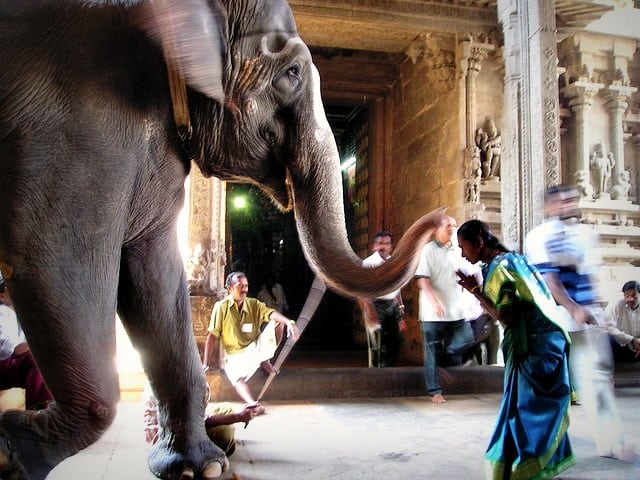
Table of Contents
If you learn basic Hindi, you will find it goes a goes a long way when traveling in India
This is a guest post by Indian blogger Shalu Sharma, who published a book called “Essential Words and Phrases for Travellers to India.” To learn basic Hindi words and phrases you will need, and to buy the book, read on.
As long as you know English, there will be few communication issues in India. Most Indians know some English, however some will not be able to converse as fluently as you would prefer including taxi drivers, waiters, porters and hotel staff. This is where some basic Hindi words, phrases and sentences can come handy. You can learn Hindi through English, and basic Hindi words for beginners, quite easily.
More reading on Breathedreamgo about travel in India
- Learn all about How to speak English in India here.
- If you are planning to travel in India, our India for Beginners custom tours are perfect for first time visitors .
- In our post on visiting the Taj Mahal, you will learn everything you need to know
- Get tips on what to wear when travelling in India here and where to shop and what to buy India .
Where exactly is Hindi spoken?
Hindi is spoken in many parts of India, especially the urban areas and the North. It is the main language of 12 states in India, including Delhi , Uttar Pradesh, Bihar, Jharkhand, Haryana, Madhya Pradesh , Chhattisgarh, Himachal Pradesh, and Rajasthan. About 44% of Indians say their mother tongue is Hindi.
“The 2011 Census data shows that most Indian States, apart from a handful of States in northern and central India, do not primarily speak Hindi but have adopted the language as a secondary language. Most southern and northeastern States are not Hindi-speaking and have adopted English as their secondary language,” According to this article in The Hindu .
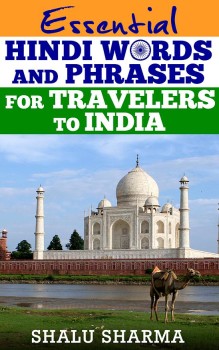
In some South Indian states, such as Andhra Pradesh and Karnataka, many people will respond if you speak Hindi with them. So if you were to polish up on some Hindi before going to India, it will prove to be a valuable asset no matter where you are going.
Hindi can be quite challenging for the average English speaker. It is a phonetic language, so it’s spoken as it is written. Hindi uses a lot of English words so you can often replace Hindi words with English. For example, there are no words for “station” or “doctor” in Hindi (if there is one, I am not aware of it and have been speaking Hindi all my life). Some other commonly used English words include railway, hospital, train, cycle, motor, bus, cricket, karma, thug, guru, jungle, bungalow and so on. [NOTE: some of these English words originated in India.] If you are stuck on a Hindi word, then replace it with its English equivalent.
Below are some common Hindi words, phrases and sentences widely used in India. Just pronounce the words the way they’re written.
Basic Hindi words, phrases and sentences
Hello – Namaste or Pranam
Hello Amit – Namaste Amit ji (ji at the end of the name is used to show respect)
I am from USA – Mai USA se hum
Mine – Mera
This is mine – Ye mera hai
Yours – Aap ka
Is this yours – Kya ye aap ka hai
Who are you – Aap kaun hai
Clothes – Kapra
Where are my clothes – Mera kapra kaha hai
Tea – Chai
I need a cup of tea – Mujhe ek cup chai chahiye
Water – Paani
I need a bottle of water – Mujhe ek bottle paani chahiye
Food – Khana
Give me food – Mujhe khana do
Do you speak English – Kya apa English bolte hai
Speak slowly – Dheray boliye
Yes – Haa
Please – Kripya
Thank you – Dhanevaad
More basic Hindi sentences
How are you – Aap kaise hai
I am fine – Mai thik hu
Nice to meet you – Aap se milkar khusi hui
What is your name – Aap ka kya naam hai
My name is Mariellen – Mera naam Mariellen hai
Where are you from – Aap kaha se hai
I am from Canada – Mai Canada se hu
Where is the station – Station kaha hai
Where is the bus stand – Bus stand kaha hai
Where is the toilet – Toilet kaha hai
Can you help me – Kya aap meri madaad karenge
What’s this – Ye kya hai
I want to buy this – Mujhe ye kharidna hai
How much is this – Ye kitnay ka hai
Lower the price – Daam kum kijiye
There are some things that make learning Hindi challenging. Hindi has gender nouns (masculine or feminine); it is perhaps the most difficult part of learning Hindi. Also, the various states of India speak Hindi differently. For instance, my Bihari Hindi is different from Hindi spoken in Delhi. It’s only when we write Hindi that we use the formal methodology. Finally, though India is a country where English is spoken widely, it is still useful to learn some basic Hindi for your travels to India. I suggest you memorize some of these key words Hindi words and phrases and don’t be afraid to use them. – Shalu Sharma
Recommended language learning courses and apps
I’m currently researching the best courses and apps for learning Hindi (and other languages). I’m looking into Doulingo at the moment. This post on Travel Freak about learning a new language recommends Rosetta Stone. – Mariellen
Learn Hindi language faster
I found this video by Karl Rock really helped pinpoint the specific challenges that English speakers face when trying to learn Hindi. Watching it could really help you learn basic Hindi faster. – Mariellen

About the author
Shalu Sharma is the author of “Essential Hindi Words And Phrases For Travellers To India.” Shalu is also the editor and founder of ShaluSharma.com , a blog about travels to India. Originally from Bihar, she speaks Hindi at home.
If you enjoyed this post, you can….
Sign up to The Travel Newsletter in the sidebar and follow Breathedreamgo on all social media platforms including Instagram, TripAdvisor, Facebook, Pinterest, and Twitter. Thank you! </p
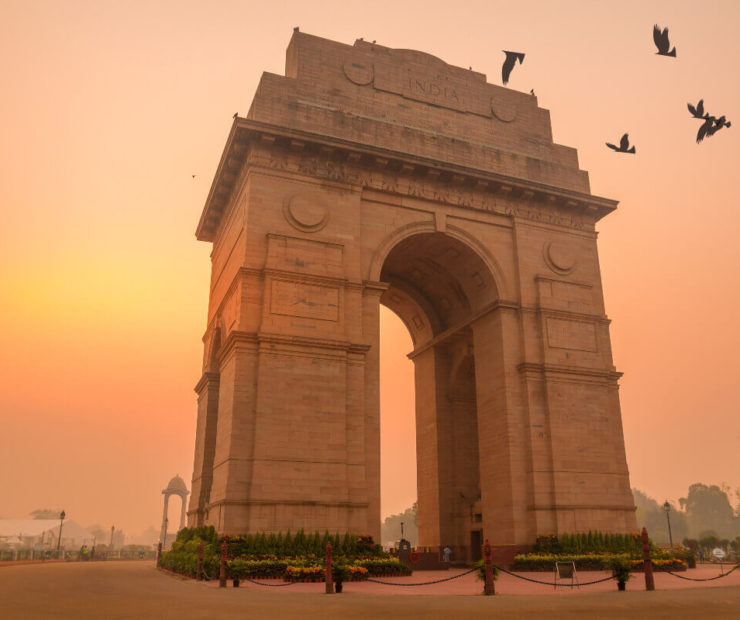
Delhi Travel Guide: Things to do in Delhi
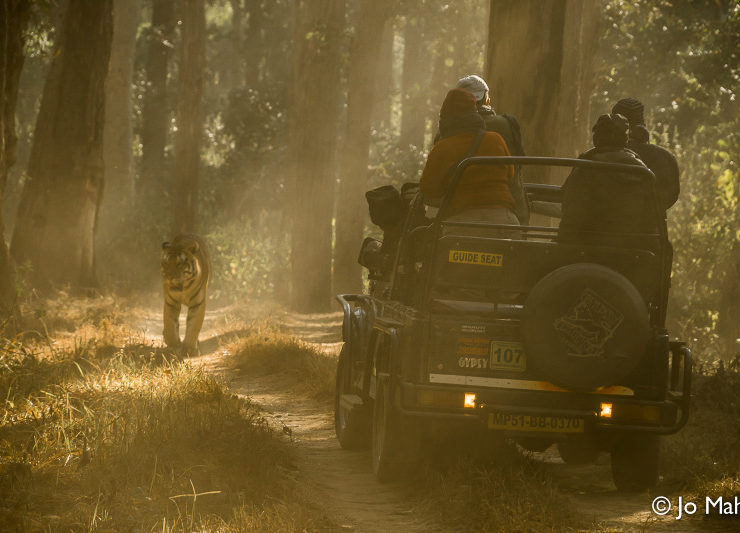
How to thrive on a small group tour

Exodus Travels Land of the Tiger tour of India
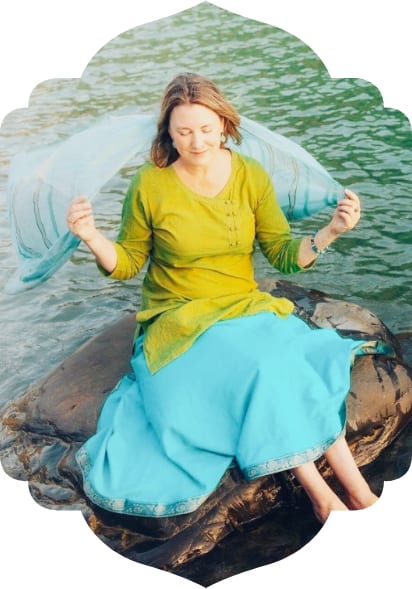
About Mariellen Ward
Professional travel writer Mariellen Ward is the founder of award-winning Breathedreamgo. Mariellen has a BA in Journalism and has been travel writing and blogging since 2005. She has won many awards, including a National Tourism Award from Incredible India Tourism, and writes for some of the world’s leading publications including BBC Travel and NatGeo Traveller India.
Sign up for my newsletter and get inspiration to live your travel dreams
Privacy Overview

Start Learning Hindi in the next 30 Seconds with a Free Lifetime Account

- Beelinguapp
- Very Easy & Helpful Basic Hindi Phrases For Beginners
Very Easy & Helpful Basic Hindi Phrases For Beginners
Many people have contrasting ideas regarding when is the ideal time to visit India. And that's alright. Because if you think about it, the perfect time to explore this beautiful country really depends on what you want to do and see. If you want to escape the crowds and don't mind the burning heat, you might want to consider traveling sometime in March and June . If you want to channel your inner Phunsukh Wangdu (if you don’t know who this person is, please watch the movie 3 idiots ), you can head over to north India between June and August. If you want to experience the magic of the many Hindu festivals under the clear, blue sky, think about touring from November to March. Regardless of the weather and the season, India will offer you many enjoyable things to do and breathtaking sights to see, making your vacation one of the best. And to help you prepare for this unforgettable escapade, here’s a mini pocketbook of practical Hindi phrases to learn so you can talk the talk with the locals. Just remember that Hindi is one of the two official languages of India, so knowing some basic phrases could help you better understand its unique culture.
- Hello: नमस्ते (namaste)
- Goodbye: नमस्ते (namaste)
- See you later: अलविदा।(phir milenge)
- Good morning: शुभ प्रभात (shub prabhat)
- Good afternoon: नमस्ते (namaste)
- Good evening: नमस्ते (namaste)
- Good night: शुभ रात्रि (shubh ratri)
- Yes: हाँ (haan)
- No: नहीं (naheen)
- Maybe: शायद (shaayad)
- Thank you: धन्यवाद (dhanyavad)
- Thank you very much: बहुत धन्यवाद (bahut dhanyavaad)
- You’re welcome: आपका स्वागत है (aapka swagat hai)
- I don’t know: मुझको मालूम नहीं (mujhko maaloom naheen)
- Excuse me: सुनिए (suniye)
- I am sorry: माफ़ कीजिए (maaf kijiye)
- What’s new: क्या चल रहा हैं (kya chal raha hai)
- What’s your name: आपका नाम क्या है (aapka naam kya hai)
Related Posts
Korean vocabulary: a list of fruit and vegetable names, “apfel” & a list of other fruit names in german, 7 things you didn't know about valentine’s day, subscribe to our newsletter.
- [email protected]
- +91-9212707093
- +91-8527599523

- Common Hindi Phrases Every Beginner Should Know
- Language Translation
- September 5, 2023
Learning a new language can be an exciting and rewarding experience, and Hindi is no exception.
As one of the most widely spoken languages globally, Hindi offers a wealth of culture, history, and communication opportunities.
Whether you’re planning a trip to India, want to connect with Hindi-speaking friends or family, or simply have an interest in this beautiful language, this blog post is your guide to common Hindi phrases every beginner should know.
Now, let’s explore a selection of essential Hindi phrases for beginners:
Basic Greetings and Politeness:
1. Namaste (नमस्ते): The quintessential Hindi greeting, often accompanied by a slight bow with folded hands. It translates to “Hello” or “I bow to you.”
2. Kaise ho? (कैसे हो?): This phrase means “How are you?” It’s a common way to ask about someone’s well-being.
3. Shukriya (धन्यवाद): When someone does something nice for you, use “Shukriya” to say “Thank you.”
4. Aapka naam kya hai? (आपका नाम क्या है?): To ask someone’s name, say, “Aapka naam kya hai?” which means “What is your name?”
Basic Conversational Phrases:
1. Haan (हां) / Nahi (नहीं): “Haan” means “Yes,” and “Nahi” means “No.” These are straightforward responses to questions.
2. Main theek hoon (मैं ठीक हूँ): If you’re feeling fine, you can say, “Main theek hoon,” which means “I am fine.”
3. Mujhe nahi pata (मुझे नहीं पता): When you don’t know the answer to a question, say, “Mujhe nahi pata,” which means “I don’t know.”
Numbers and Counting:
1. Ek (एक): “Ek” means “One.” This is the starting point for counting in Hindi.
2. Do (दो): “Do” means “Two.”
3. Teen (तीन): “Teen” means “Three.”
4. Chaar (चार): “Chaar” means “Four.”
5. Panch (पाँच): “Panch” means “Five.”
6. Saat (सात): “Saat” means “Seven.”
7. Aath (आठ): “Aath” means “Eight.”
8. Nau (नौ): “Nau” means “Nine.”
9. Das (दस): “Das” means “Ten.”
Directions and Location:
1. Kahaan hai…? (कहाँ है…?): To ask for directions to a specific place, start with “Kahaan hai,” which means “Where is…”
2. Right (दायें) / Left (बायें): When navigating, knowing “right” and “left” can be helpful.
3. Aage (आगे) / Peeche (पीछे): “Aage” means “ahead,” and “Peeche” means “behind.”
4. Kitni door hai…? (कितनी दूर है…?): To inquire about the distance to a location, ask, “Kitni door hai…?” which means “How far is…”
Common Questions:
1. Kab? (कब?): “Kab” means “When.” You can use it to ask about time or schedules.
2. Kyun? (क्यूँ?): “Kyun” means “Why.” It’s a fundamental question word for seeking reasons or explanations.
3. Kahaan? (कहाँ?): “Kahaan” means “Where.” Use it to ask about locations or directions.
4. Kaise? (कैसे?): “Kaise” means “How.” You can employ it to inquire about methods or conditions.
Emergencies and Essentials:
1. Madad (मदद): In case of an emergency, “Madad” means “Help.”
2. Doctor (डॉक्टर): “Doctor” is the same in Hindi as in English, making it easy to seek medical assistance.
3. Police (पुलिस): Similarly, “Police” is a familiar term in Hindi.
4. Pani (पानी): “Pani” means “Water.” It’s a crucial word to know when you need a drink or want to ask for water.
Eating and Dining Out:
1. Khana (खाना): “Khana” means “Food.” Use it when discussing meals or dining.
2. Menu (मेन्यू): “Menu” is another term shared with English, making it easy to navigate restaurant offerings.
3. Chai (चाय) / Coffee (कॉफी): “Chai” is “Tea,” and “Coffee” is the same in Hindi as well.
4. Bill (बिल): To ask for the bill at a restaurant, you can say “Bill.”
Polite Phrases:
1. Dhanyavaad (धन्यवाद): To express gratitude more formally, use “Dhanyavaad,” which means “Thank you.”
2. Kripya (कृपया): “Kripya” is often used to make polite requests and means “Please.”
3. Mafi chahiye (माफ़ी चाहिए): If you want to apologize, say “Mafi chahiye,” which means “I’m sorry” or “Excuse me.”
Basic Courtesies:
1. Namaste (नमस्ते): Revisiting our first phrase, “Namaste” is a polite and respectful way to greet someone.
2. Aap (आप): “Aap” is a formal way to address someone respectfully, similar to using “Sir” or “Ma’am” in English.
3. Kripaya (कृपया): To be even more polite, add “Kripaya” before making a request or asking a question.
Numbers and Time:
1. Ghante (घंटे): “Ghante” means “Hours.” Use it when talking about time.
2. Minute (मिनट): “Minute” is also the same in Hindi.
3. Din (दिन): “Din” means “Day.” It’s a useful term when discussing dates or scheduling.
Weather and Seasons:
1. Mausam (मौसम): “Mausam” means “Weather.” You can use it to ask about the weather.
2. Garmi (गर्मी) / Thand (ठंड): “Garmi” means “Hot,” and “Thand” means “Cold.”
3. Varsha (वर्षा) / Barsaat (बरसात): “Varsha” means “Rain,” and “Barsaat” is another word for “Rain.”
Getting Around:
1. Auto (ऑटो): In many Indian cities, auto-rickshaws are a common mode of transportation. “Auto” is a convenient term to know when hailing one.
2. Station (स्थान): “Station” is a word used for transportation hubs like train or bus stations.
3. Bus (बस) / Train (ट्रेन): “Bus” and “Train” are the same in Hindi as well.
Common Expressions:
1. Bilkul (बिल्कुल): “Bilkul” means “Absolutely” or “Certainly,” a handy expression in various situations.
2. Achha (अच्छा): “Achha” is an expression of agreement or understanding, similar to saying “Okay.”
3. Suno (सुनो): “Suno” means “Listen” and can be used to get someone’s attention.
Exploring and Shopping:
1. Market (बाज़ार): “Market” is a common word in Hindi and is used to refer to shopping areas.
2. Shopping (खरीददारी): “Shopping” is also similar in Hindi.
3. Kitne ka hai? (कितने का है?): To ask about the price of something, say “Kitne ka hai?” which means “How much does it cost?”
4. Aur kuch? (और कुछ?): If you want to ask, “Anything else?” use “Aur kuch?”
Colors and Descriptions:
1. Rang (रंग): “Rang” means “Color,” which is helpful for describing objects or clothing.
2. Lamba (लम्बा) / Chhota (छोटा): “Lamba” means “Long,” and “Chhota” means “Short.”
3. Sundar (सुंदर): “Sundar” means “Beautiful.” It’s a lovely word to use when appreciating something.
Food and Dining:
1. Khana (खाना): “Khana” means “Food,” a term you’ll often encounter in menus or discussions about meals.
2. Roti (रोटी) / Chawal (चावल): “Roti” is “Flatbread,” and “Chawal” is “Rice.”
3. Paneer (पनीर): “Paneer” is “Cottage cheese,” commonly used in Indian vegetarian dishes.
4. Namak (नमक) / Mirch (मिर्च): “Namak” is “Salt,” and “Mirch” is “Chili.”
Time Expressions:
1. Abhi (अभी): “Abhi” means “Now” or “Right now.” It’s useful for indicating the present moment.
2. Kal (कल): “Kal” means “Tomorrow.”
3. Aaj (आज): “Aaj” means “Today.”
Emergencies and Health:
1. Dard (दर्द): “Dard” means “Pain,” a crucial term when seeking medical assistance.
2. Hospital (हस्पताल): “Hospital” is the same in Hindi.
3. Ambulance (एम्बुलेंस): “Ambulance” is also a familiar term in Hindi.
4. Police (पुलिस): “Police” is another word shared between Hindi and English.
Phrases for Making Friends:
1. Mera dost hai (मेरा दोस्त है): To introduce someone as your friend, say “Mera dost hai,” which means “He/She is my friend.”
2. Aap mere dost hain (आप मेरे दोस्त हैं): To express that someone is your friend, say “Aap mere dost hain,” which means “You are my friend.”
Learning common Hindi phrases is an excellent starting point for your language journey. These phrases not only help you navigate daily interactions but also provide insights into the culture and heritage of Hindi-speaking regions. Remember that language learning is a gradual process, so be patient with yourself and practice regularly. As you progress, you’ll be able to engage in more in-depth conversations and explore the beauty of the Hindi language further. Happy learning!
If you are in search of effective Hindi Translation , contact us at +91-8527599523 or quickly send us a instant quote .
Leave A Comment Cancel Comment
Save my name, email, and website in this browser for the next time I comment.

- Constructed scripts
- Multilingual Pages
Useful Hindi phrases
A collection of useful phrases in Hindi, an Indo-Aryan language spoken in India, Fiji, and a number of other countries.
Jump to phrases
See these phrases in any combination of two languages in the Phrase Finder . If you can provide recordings, corrections or additional translations, please contact me .
Key to abbreviations: inf = informal, frm = formal, m = said by a man, >m = said to men, f = said by women, >f = said to women.
Corrections and additional phrases by Nikhil Sinha and Webmaster-Translations . Recordings by Vishal Khanna, Nazish Qamar and Jin Ravi Jamal Rau.
Download all the audio files (Zip format, 2.46MB)
If you would like to make any corrections or additions to this page, or if you can provide recordings, please contact me .
Information about Hindi | Phrases | Numbers | Kinship words | Time | Tongue twisters | Tower of Babel | Learning materials | Electronic dicitonaries and translators
Collections of Hindi phrases (some with audio) http://linguanaut.com/english_hindi http://www.kwintessential.co.uk/resources/language/hindi-phrases.html http://www.hindilearner.com/hindi_phrases.html
Learn Hindi online with Rocket Languages http://www.rocketlanguages.com/hindi/premium/
Phrases in Indo-Aryan languages
Assamese , Bengali , Bhojpuri , Dogri , Garhwali , Gujarati , Hindi , Kashmiri , Magahi , Maithili , Maldivian , Marathi , Nepali , Odia (Oriya) , Punjabi , Romani , Sanskrit , Sindhi , Sinhala , Sylheti , Urdu
Phrases in other languages
728x90 (Best VPN)
Why not share this page:
If you like this site and find it useful, you can support it by making a donation via PayPal or Patreon , or by contributing in other ways . Omniglot is how I make my living.
Get a 30-day Free Trial of Amazon Prime (UK)

- Learn languages quickly
- One-to-one Chinese lessons
- Learn languages with Varsity Tutors
- Green Web Hosting
- Daily bite-size stories in Mandarin
- EnglishScore Tutors
- English Like a Native
- Learn French Online
- Learn languages with MosaLingua
- Learn languages with Ling
- Find Visa information for all countries
- Writing systems
- Con-scripts
- Useful phrases
- Language learning
- Multilingual pages
- Advertising

Hindi is used in northern and central India and parts of many other countries.
See also Fiji Hindi , Sarnami Hindi , and Uniscript .
Language information at Wikipedia
Language map of India
Writing system information at Omniglot and Wikipedia
Useful phrases can be found at "Learn Indian Languages"
Alternate names for Hindi include Khari Boli and Khadi Boli

IMAGES
VIDEO
COMMENTS
The following sentence is a great example of this: मेज़ पर पानी की बोतल है ( mez par paanee kee botal hai) - The water bottle is on the table. Here, the Hindi word for water is used ( paanee ), the Urdu word for table ( mez) and the English word for bottle, albeit with a slightly different pronunciation.
HindiPod101 is the best language travel guide in Hindi even for beginners, and today we'll be teaching you some useful Hindi phrases for travel! Traveling to a foreign land is one of the most remarkable things in life. And yet, the thought of it makes us all a little nervous. The biggest hurdle that gives us cold feet is the language problem.
Add a "bahut: baa-hot" to the beginning and you have a thank you very much! 10. Please: Kripa "Cryp-ya". An important note when speaking Hindi: Please is used at the beginning of a sentence! 11. Sorry: Maaf kijiye "Maa-F key-GEE-yay". 12. Excuse me/Give way: Zara raaste dena "Zara raas-tay day-na".
Hindi is the most widely spoken language in India, with the exception of two states - Kerala and Tamil Nadu, ... All World Nomads entities listed above, including nib Travel Services Europe Limited, nib Travel Services Limited and nib Travel Services (Australia) Pty Ltd, are subsidiaries of nib holdings limited (ABN 51 125 633 856). ...
To be able to even say something as simple as hello and thank you in the local language will always bring a smile to the locals. It is also very respectful to know some commons greeting phrases. Check out essential Hindi phrases you should learn for travel in India below: Greetings. Hello/Hi - Namaste; Good morning - Suprabhaat
Whether it's the bustling streets of Mumbai or the serene landscapes of the Himalayas, knowing a few key Hindi phrases can transform your travel experience. Let's make your trip unforgettable with these 10 essential Hindi phrases that are perfect for any traveler starting their linguistic journey! 1. Greetings - Namaste ...
Based on our team of avid travelers' experiences, here is a consolidated list of Hindi phrases and meaning to use. Namaste - It is a respectful greeting to start and end a conversation. It is similar to hello or hi. Chalo - Let's go. Bahut Hua - Enough. Accha or Thik hai - Okay.
100 Useful Hindi Phrases For Travelling To India. Hello everyone, I hope you all are doing great. In this blog we are going to discus about basic Hindi phrases.This will be very useful for International tourists while travelling in India and also you would not face any kind of problem.
Hindi phrasebook. Hindi ( हिन्दी) is an Indo-Aryan language spoken in India, Nepal, and throughout the Indian diaspora in Fiji, Singapore, Uganda, United Arab Emirates, Trinidad, Suriname, Guyana, South Africa, UK, USA, Canada, Australia, New Zealand, Mauritius and other countries. Where there are 22 official languages and over ...
From the majestic Himalayas in the north to the serene backwaters of Kerala in the south, every region of India offers a kaleidoscope of vibrant colours, sounds, tastes, and memories. To get you started on your Hindi-learning journey, here are a few simple words. नमस्ते - Namaste - Hello. अलविदा - Alvida ...
Let's explore essential Hindi phrases and insights into India's cultural nuances to ensure your journey is not just a visit, but a deep dive into the essence of this incredible land. Getting Started with Essential Hindi Phrases Greetings and Basic Politeness. Namaste (नमस्ते): A universal greeting for all times of the day ...
For those wandering the enchanting lands of India, a sprinkle of Hindi phrases can be your secret tool to peel back layers of local life and travel with finesse. Here are 35 Hindi language hacks, tailored to give you that jet-setting edge: "Namaste!" — A universal greeting that opens doors and hearts. "Aap kaise hain?" — "How are ...
Basic Hindi words, phrases and sentences. Hello - Namaste or Pranam. Hello Amit - Namaste Amit ji (ji at the end of the name is used to show respect) Me - Mai. I am from USA - Mai USA se hum. Mine - Mera. This is mine - Ye mera hai. Yours - Aap ka. Is this yours - Kya ye aap ka hai.
Inter Partner Assistance S.A. UK Branch office address is 106-118 Station Road, Redhill, RH1 1PR. Inter Partner Assistance S.A. is part of the AXA Group. WorldNomads.com Pty Limited markets and promotes travel insurance products of nib Travel Services Limited (License No.1446874), at PO Box 1051, Grand Cayman KY1-1102, Cayman Islands.
क्या आप मुझे कुछ छूट दे सकते हैं? Could you give me a discount? Learn the top Hindi travel phrases you should know. Get the translations, sample sentences, and audio lessons inside. Brought to you by HindiPod101.
Hindi books are also very useful. Make sure to take a look at our Hindi book list for kids and follow our Learn Hindi for Kids series. Author: Reena Bhansali is the owner of Hindi By Reena — the world's first one-stop-shop for Hindi books, tips and courses. She is also the author of the popular children's language book "My First Hindi ...
Just remember that Hindi is one of the two official languages of India, so knowing some basic phrases could help you better understand its unique culture. Hello: नमस्ते (namaste) Goodbye: नमस्ते (namaste) See you later: अलविदा। (phir milenge) Good morning: शुभ प्रभात (shub prabhat) Good ...
Come with me to the fruit market and learn the most useful Hindi travel phrases from a native speaker and me! We start with the most useful phrase in India, ...
Whether you're planning a trip to India, want to connect with Hindi-speaking friends or family, or simply have an interest in this beautiful language, this blog post is your guide to common Hindi phrases every beginner should know. Now, let's explore a selection of essential Hindi phrases for beginners: Basic Greetings and Politeness: 1.
Useful Hindi phrases. A collection of useful phrases in Hindi, an Indo-Aryan language spoken in India, Fiji, and a number of other countries. Jump to phrases. See these phrases in any combination of two languages in the Phrase Finder. If you can provide recordings, corrections or additional translations, please contact me.
In this video I have one hundred travel oriented Hindi sentences, which are also useful in day to day conversation. These are perfect for beginners as well a...
https://bit.ly/3dgVDw9 ← If you want to study more, click here and get the best resources to learn in the most efficient way. ↓ More details below ↓Step 1: G...
Hindi is used in northern and central India and parts of many other countries. See also Fiji Hindi, Sarnami Hindi, and Uniscript. ... travel phrases in English: 1) Where is my room? 2) Where is the beach? 3) Where is the bar? 4) Don't touch me there! Do you have a language or dialect to add?